

Tourism in Greece
Disclaimer: Some posts on Tourism Teacher may contain affiliate links. If you appreciate this content, you can show your support by making a purchase through these links or by buying me a coffee . Thank you for your support!
Tourism in Greece is big business! But why is tourism here so important and why does it matter? Read on to find out…
The geography of Greece
Tourism in greece , statistics about tourism in greece, the most popular tourist attractions in greece, the most popular types of tourism in greece, the economic impacts of tourism in greece, the social impacts of tourism in greece, the environmental impacts of tourism in greece, faqs about tourism in greece, to conclude: tourism in greece.
Greece is a country located in southeastern Europe, situated on the southern end of the Balkan Peninsula. It is known for its rich history, ancient civilization, stunning landscapes, and thousands of islands scattered throughout the Aegean and Ionian Seas. Here is an overview of the geography of Greece:
1. Mainland Greece: The mainland of Greece is primarily mountainous, with a rugged landscape dominated by the Pindus Mountain Range. The highest peak is Mount Olympus, famous in Greek mythology as the home of the gods. Other notable mountain ranges include the Rhodope Mountains and the Taygetus Range.
2. Peninsulas: Greece has several prominent peninsulas. The most significant is the Peloponnese Peninsula, which is connected to the mainland by the Isthmus of Corinth. The other major peninsula is the Halkidiki Peninsula in northern Greece, known for its beautiful beaches and resorts.
3. Islands: Greece is famous for its numerous islands, of which there are over 6,000, although only around 200 are inhabited. The largest and most well-known islands include Crete, Rhodes, Corfu, Mykonos, Santorini, and Zakynthos. The islands offer diverse landscapes, ranging from sandy beaches to rugged cliffs, volcanic formations, and ancient ruins.
4. Seas and Coasts: Greece is surrounded by several seas. The Aegean Sea lies to the east of the mainland and is home to the majority of the Greek islands. The Ionian Sea is located to the west of the mainland and is known for its crystal-clear waters. Greece also has a coastline along the Mediterranean Sea to the south. The country’s coastline stretches for approximately 13,676 kilometres (8,498 miles), making it one of the longest coastlines in the world.
5. Rivers and Lakes: Greece has several rivers, although most of them are relatively small due to the country’s mountainous terrain. The longest river is the Axios, flowing through northern Greece. The country also has several lakes, including Lake Trichonida, Lake Vegoritis, and Lake Kerkini.
6. Climate: Greece has a Mediterranean climate, characterised by hot, dry summers and mild, wet winters. However, there are regional variations due to the country’s diverse topography. The northern regions experience cooler temperatures, while the southern parts, including the islands, have a more typical Mediterranean climate.
7. National Parks: Greece has several national parks that preserve its natural beauty. Some notable national parks include Mount Olympus National Park, Vikos-Aoos National Park, and Samaria Gorge National Park. These parks offer opportunities for hiking, wildlife spotting, and exploring Greece’s unique ecosystems.
8. Volcanic Activity: Greece has a history of volcanic activity. The most famous volcanic island is Santorini, known for its caldera and stunning sunsets. There are also volcanic areas in the Aegean Sea, such as the volcanic island of Nisyros and the Methana Peninsula near Athens.
9. Biodiversity: Greece is home to diverse flora and fauna. Its ecosystems range from Mediterranean forests to wetlands, coastal areas, and alpine meadows. The country supports a variety of plant and animal species, including endangered species such as the loggerhead sea turtle and the Mediterranean monk seal.
10. Geographical Significance: Greece’s geography has played a significant role in its history and culture. The mountainous terrain provided natural fortifications for ancient Greek city-states, and the seas facilitated trade and cultural exchange. The country’s landscapes, including iconic sites like the Acropolis and the Delphi ruins, continue to attract tourists from around the world.
Overall, Greece’s geography offers a blend of stunning natural landscapes, historical sites, and vibrant coastal areas, making
The tourism industry in Greece is a significant contributor to the country’s economy. Greece has long been a popular tourist destination, attracting millions of visitors from around the world each year. Here is an overview of the tourism industry in Greece:
1. Importance to the Economy: Tourism is one of the main pillars of the Greek economy, contributing significantly to the country’s GDP and employment. It is estimated that tourism accounts for around 20% of Greece’s GDP and employs a large portion of the population, particularly in the summer months when tourist arrivals peak.

2. Natural and Cultural Attractions: Greece offers a wealth of natural and cultural attractions that draw tourists. The country is renowned for its ancient archaeological sites, including the Acropolis in Athens, the Palace of Knossos in Crete, and the ancient theatre of Epidaurus. The picturesque Greek islands, with their pristine beaches, charming villages, and traditional architecture, are also major tourist magnets.
3. Island Tourism: The Greek islands are a major highlight of Greek tourism. Each island has its own unique charm and appeal, attracting visitors seeking sun, sea, and relaxation. Popular island destinations include Santorini, Mykonos, Rhodes, Corfu, and Zakynthos. These islands offer a combination of stunning beaches, historic sites, vibrant nightlife, and traditional Greek hospitality.
4. Cultural Tourism: Greece’s rich cultural heritage is a significant draw for tourists. Many visitors come to experience the birthplace of Western civilization and explore the country’s ancient ruins, museums, and historical landmarks. Athens, with its iconic landmarks like the Parthenon and the National Archaeological Museum, is a major cultural hub.
5. Outdoor Activities: Greece’s diverse landscape offers opportunities for various outdoor activities, attracting adventure and nature enthusiasts. Activities such as hiking, mountain biking, sailing, snorkelling, and windsurfing can be enjoyed across the country. The rugged mountains, national parks, and coastal areas provide a backdrop for outdoor adventures.
6. Gastronomy and Wine Tourism: Greek cuisine is renowned worldwide, and food tourism has gained popularity in recent years. Visitors can indulge in traditional Greek dishes, sample local wines, and explore culinary traditions. Regions such as Santorini, Crete, and the Peloponnese are known for their vineyards and wine production.
7. Cruise Tourism: Greece is a popular destination for cruise ships, with many itineraries including stops in Athens and various Greek islands. Cruising allows visitors to experience multiple destinations and explore the country’s coastal beauty.
8. Religious and Pilgrimage Tourism: Greece holds religious significance for various faiths. The monasteries of Meteora, the Mount Athos peninsula, and the religious sites of the Greek Orthodox Church attract religious and pilgrimage tourists.
9. Seasonality: Greek tourism is highly seasonal, with the peak season occurring during the summer months of June to August. The warm weather, sunny beaches, and school holidays make it an ideal time for beach vacations. However, efforts are being made to promote Greece as a year-round destination by highlighting its cultural, culinary, and nature-based offerings during the off-peak seasons.
10. Sustainability and Ecotourism: There is a growing focus on sustainable tourism practices in Greece. Efforts are being made to protect the country’s natural and cultural heritage, promote eco-friendly accommodations, and encourage responsible tourism practices.
Overall, the tourism industry in Greece is vital for the country’s economy, offering a diverse range of attractions and experiences for visitors. The country’s rich history, stunning landscapes, beautiful islands, and warm hospitality continue to make it a sought-after destination for travellers from around the globe.
Now lets take a look at some statistics that emphasise the scale of tourism in Greece:
1. International Tourist Arrivals: In 2019, Greece welcomed a record-breaking 34 million international tourist arrivals.
2. Tourism Revenue: Tourism contributed approximately 20% of Greece’s GDP, generating around 18 billion euros in revenue in 2019.
3. Top Source Markets: The top source markets for tourism in Greece are Germany, the United Kingdom, France, Italy, and the United States.
4. Greek Islands: The Greek islands are a major attraction, with more than 200 inhabited islands. In 2019, the most visited islands were Crete, Rhodes, Santorini, Mykonos, and Corfu.
5. Cruise Tourism: Greece is a popular destination for cruise ships. In 2019, over 5 million cruise passengers visited Greek ports, with the majority arriving in Athens (Piraeus) and the islands of Santorini and Mykonos.
6. Accommodation: Greece offers a wide range of accommodation options, including hotels, resorts, villas, and apartments. In 2019, there were over 15,000 hotels and other accommodation establishments in the country.
7. Cultural Tourism: Greece’s rich cultural heritage attracts a significant number of tourists. The country is home to 18 UNESCO World Heritage Sites, including the Acropolis of Athens, Delphi, and the archaeological sites of Mycenae and Epidaurus.
8. Beach Tourism: Greece’s beautiful coastline and numerous sandy beaches are major draws for tourists. The country boasts more than 400 Blue Flag beaches, which are recognized for their cleanliness and environmental sustainability.
9. Tourism Employment: The tourism sector provides a significant number of jobs in Greece. In 2019, it was estimated that tourism supported around 1 in 5 jobs in the country.
10. Seasonality: Greek tourism is highly seasonal, with the summer months of June to August being the peak season. During this time, popular destinations can become crowded, and prices for accommodations and flights tend to be higher.
It’s important to note that these statistics are based on pre-pandemic data, and the tourism industry has been significantly impacted by the global COVID-19 pandemic. It is expected that tourism statistics will vary in the coming years as the industry recovers.
Greece is home to numerous iconic tourist attractions that showcase its rich history, stunning landscapes, and cultural heritage. Here are some of the most popular tourist attractions in Greece:
1. Acropolis of Athens: The Acropolis is a UNESCO World Heritage site and a symbol of ancient Greece. It houses several ancient structures, including the Parthenon, Erechtheion, and Propylaea, offering breathtaking views of Athens.
2. Santorini: Known for its dramatic cliffside towns, blue-domed churches, and stunning sunsets, Santorini is one of the most famous Greek islands. Visitors flock to the towns of Fira and Oia to experience the unique beauty and charm of the island.
3. Delphi: Delphi was considered the centre of the world in ancient Greece. The archaeological site is renowned for its Temple of Apollo, Theater, and the Oracle of Delphi. It offers a glimpse into the spiritual and cultural significance of ancient Greek civilization.
4. Meteora: This UNESCO World Heritage site features breathtaking monasteries perched on towering rock formations. Meteora offers awe-inspiring views and a sense of tranquillity and spirituality.
5. Mykonos: Known for its vibrant nightlife, picturesque white-washed buildings, and beautiful beaches, Mykonos is a popular destination for party-goers and beach lovers. Its charming narrow streets are filled with boutique shops, restaurants, and bars.
6. Rhodes Town: The mediaeval city of Rhodes Town is a UNESCO World Heritage site and a fascinating blend of ancient history and modern amenities. The fortified Old Town features mediaeval walls, narrow alleys, and the impressive Palace of the Grand Master.

7. Crete: The largest Greek island, Crete, offers a diverse range of attractions. Visitors can explore ancient ruins like the Palace of Knossos, relax on beautiful beaches, hike through the Samaria Gorge, and immerse themselves in traditional Cretan culture.
8. Ancient Olympia: This ancient sanctuary was the birthplace of the Olympic Games. Visitors can explore the archaeological site, which includes the Temple of Zeus, the stadium, and the museum that showcases artefacts from the ancient Olympic Games.
9. Corinth Canal: The Corinth Canal connects the Gulf of Corinth with the Saronic Gulf. Visitors can marvel at the engineering feat of the canal and enjoy panoramic views from the bridges that span its length.
10. Mount Athos: Located on the Athos peninsula in northern Greece, Mount Athos is a monastic community and UNESCO World Heritage site. Access to Mount Athos is restricted to men only, but boat tours are available to view the stunning monasteries from the sea.
These are just a few of the many popular tourist attractions in Greece. The country’s rich history, stunning landscapes, and vibrant culture offer a wide range of experiences for visitors to explore.
Greece offers a diverse range of tourism experiences that cater to various interests and preferences. Here are some of the most popular types of tourism in Greece:
1. Cultural Tourism: Greece is renowned for its rich cultural heritage, ancient ruins, and archaeological sites. Cultural tourists flock to destinations like Athens, Delphi, Epidaurus, and Knossos to explore historical landmarks, museums, and ancient Greek ruins.
2. Island Tourism: Greece is famous for its picturesque islands, attracting millions of visitors each year. Island tourism offers opportunities for relaxation, sunbathing on beautiful beaches, exploring traditional villages, and experiencing the unique local culture. Popular island destinations include Santorini, Mykonos, Rhodes, Crete, and Corfu.
3. Beach Tourism: Greece’s coastline boasts numerous beautiful beaches, making beach tourism a significant draw. Visitors can enjoy crystal-clear waters, sandy shores, and water sports activities. Some popular beach destinations include Elafonisi Beach in Crete, Navagio Beach in Zakynthos, and Balos Beach in Crete.

4. Adventure and Outdoor Tourism: Greece’s diverse landscape offers opportunities for adventure and outdoor enthusiasts. Hiking through gorges like Samaria Gorge and Vikos Gorge, rock climbing in Meteora, and exploring the Pindus Mountain Range are popular activities. Water sports such as snorkelling, scuba diving, and windsurfing are also popular, particularly on the Greek islands.
5. Culinary Tourism: Greek cuisine is renowned worldwide, and culinary tourism has gained popularity. Visitors can indulge in traditional Greek dishes, sample local wines, and take part in cooking classes and food tours. Regions like Crete, Santorini, and the Peloponnese are known for their gastronomic delights.
6. Historical and Archaeological Tourism: Greece’s ancient history attracts tourists interested in exploring ancient ruins and archaeological sites. The Acropolis of Athens, Delphi, Olympia, and Mycenae are among the most popular historical and archaeological sites in Greece.
7. Ecotourism: Greece’s natural beauty and diverse ecosystems make it a destination for ecotourism. Visitors can explore national parks, hike through scenic trails, observe wildlife, and engage in nature conservation activities. Mount Olympus National Park, Samaria Gorge National Park, and Vikos-Aoos National Park offer opportunities for ecotourism.
8. Religious and Pilgrimage Tourism: Greece has significant religious and pilgrimage sites for various faiths. The monasteries of Meteora, the island of Patmos, and the religious sites of Mount Athos attract religious and spiritual tourists.
9. Wellness and Spa Tourism: Greece is home to several spa resorts and wellness retreats that offer relaxation, rejuvenation, and holistic therapies. Visitors can enjoy spa treatments, yoga classes, and wellness programs against the backdrop of beautiful natural surroundings.
10. Wine Tourism: Greece has a long history of winemaking, and wine tourism is gaining popularity. Visitors can explore vineyards, participate in wine tastings, and learn about traditional winemaking techniques. Regions like Santorini, Crete, and the Peloponnese are known for their wine production.
These popular types of tourism in Greece highlight the country’s diverse offerings, combining history, nature, culture, and relaxation to cater to a wide range of visitor interests.
Tourism plays a vital role in the Greek economy, contributing significantly to employment, GDP, and foreign exchange earnings. Here are some of the economic impacts of tourism in Greece:
1. GDP Contribution: Tourism in Greece is a major contributor to the country’s gross domestic product (GDP). It accounts for a significant portion of the country’s overall economic output. In recent years, tourism has contributed around 20% to Greece’s GDP.
2. Employment Generation: The tourism industry in Greece provides substantial employment opportunities. It is estimated that tourism supports a significant portion of the country’s workforce. During the peak tourist season, which is typically in the summer months, the industry employs a large number of people directly and indirectly in various sectors such as hospitality, transportation, retail, and entertainment.
3. Foreign Exchange Earnings: Tourism brings in valuable foreign exchange earnings to Greece. International visitors spend money on accommodations, meals, transportation, shopping, and various tourist activities, contributing to the country’s foreign currency reserves.
4. Regional Development: Tourism in Greece helps in the development of various regions in Greece, particularly those that are popular tourist destinations. Investments in infrastructure, accommodations, and amenities are often directed towards these regions to cater to the needs of tourists, leading to economic growth and job creation.
5. Small Business Growth: The tourism industry provides opportunities for small businesses and entrepreneurs. Local businesses, such as restaurants, cafes, souvenir shops, and tour operators, benefit from tourist spending, leading to the growth of small-scale enterprises and fostering entrepreneurship.
6. Seasonal Employment: The seasonality of tourism in Greece creates employment opportunities, particularly during the peak tourist season. Many businesses hire additional staff to meet the increased demand, providing temporary employment for locals and seasonal workers.
7. Infrastructure Development: The demand from tourists often drives infrastructure development in Greece. To cater to the needs of visitors, investments are made in transportation systems, airports, roads, accommodation facilities, and recreational amenities. These infrastructure developments not only enhance the tourist experience but also contribute to the overall development of the country.
8. Multiplier Effect: The economic impact of tourism extends beyond the tourism sector itself. Tourism spending has a multiplier effect on the economy, as it stimulates other sectors such as agriculture, manufacturing, construction, and transportation. Local suppliers and service providers benefit from increased demand, leading to further economic activity.
9. Cultural Preservation: Tourism in Greece can contribute to the preservation and promotion of Greece’s cultural heritage. Revenue generated from tourism can be reinvested in the maintenance and restoration of historical sites, museums, and cultural events, ensuring their preservation for future generations.
10. Foreign Investment: The growth of tourism in Greece can attract foreign investment in the hospitality and tourism sectors. International hotel chains, resort developers, and other tourism-related businesses may invest in Greece, bringing additional capital and expertise to the country.
Tourism in Greece has various social impacts that influence local communities, culture, and society. Here are some of the social impacts of tourism in Greece:
1. Cultural Exchange: Tourism in Greece provides opportunities for cultural exchange between tourists and local communities. Visitors have the chance to learn about Greek culture, traditions, and way of life, while locals have the opportunity to interact with people from different backgrounds and share their customs and heritage.
2. Preservation of Cultural Heritage: The presence of tourists can contribute to the preservation and conservation of Greece’s cultural heritage. The revenue generated from tourism can be used for the restoration and maintenance of historical sites, monuments, and museums, ensuring their preservation for future generations.
3. Community Empowerment: Tourism in Greece can empower local communities by creating employment and entrepreneurial opportunities. Small businesses, such as local restaurants, souvenir shops, and tour operators, can thrive due to the presence of tourists, leading to increased income and economic empowerment for community members.
4. Socio Economic Development: Tourism in Greece can contribute to the overall socioeconomic development of local communities. The industry generates income that can be reinvested in public services, infrastructure, healthcare, education, and other social amenities, improving the quality of life for residents.
5. Cultural Revitalization: Tourism in Greece can help revitalise traditional cultural practices, crafts, and performing arts. Visitors’ interest in local traditions and products can encourage the preservation and promotion of cultural heritage, stimulating cultural pride among locals and reviving traditional practices that may have declined over time.
6. Intercultural Understanding: The presence of tourists in Greece promotes intercultural understanding and tolerance. By interacting with people from different backgrounds, visitors gain a deeper appreciation for Greek culture, fostering respect and understanding for diversity.
7. Festivals and Events: Tourism in Greece can support the organisation of festivals, events, and cultural celebrations. These gatherings not only attract tourists but also provide opportunities for locals to showcase their cultural traditions, music, dance, and cuisine, promoting community engagement and pride.

8. Environmental Awareness: Tourism in Greece can raise awareness about environmental issues and the importance of preserving Greece’s natural beauty. Sustainable tourism practices, such as eco-friendly accommodations and nature conservation initiatives, can help educate both tourists and locals about the need for environmental protection.
9. Social Cohesion: The tourism industry can foster social cohesion within communities. Local residents often engage with tourists through various activities, such as offering guided tours, sharing local knowledge, or participating in cultural exchanges. These interactions can enhance social bonds, create friendships, and promote a sense of community pride.
10. Education and Cultural Exchange: The presence of tourists can encourage educational opportunities for locals. It can lead to the development of language skills, cultural knowledge, and tourism-related expertise, providing employment opportunities and enhancing the local workforce.
It is important for sustainable tourism practices to be implemented to ensure that the social impacts of tourism in Greece are positive and beneficial for both tourists and local communities.
Tourism in Greece can have both positive and negative environmental impacts in Greece. While it contributes to the appreciation and conservation of natural resources, it also poses challenges to environmental sustainability. Here are some of the environmental impacts of tourism in Greece:
1. Pressure on Natural Resources: The influx of tourists, particularly in popular destinations, can exert pressure on natural resources such as water, energy, and land. Increased water consumption, energy usage, waste generation, and land development can strain local ecosystems and resources.
2. Water Consumption: The tourism sector’s water demand, including for hotels, resorts, and recreational activities, can place stress on local water supplies, especially in areas with limited water resources. Overuse or mismanagement of water can lead to depletion of water sources, particularly during peak tourist seasons.
3. Waste Generation: Tourism in Greece generates significant amounts of waste, including packaging, food waste, and disposable items. Without proper waste management infrastructure and practices, this can contribute to pollution and strain local waste disposal systems.
4. Loss of Biodiversity and Habitat Degradation: Unsustainable tourism practices, such as uncontrolled development, deforestation, and habitat destruction, can lead to the loss of biodiversity and degradation of natural habitats. This can have negative consequences for plant and animal species, including endangered or endemic ones.
5. Coastal and Marine Pollution: Coastal areas and marine ecosystems in Greece are particularly vulnerable to pollution from tourism activities. Improper waste disposal, sewage discharge, and the use of harmful chemicals can degrade water quality, harm marine life, and damage fragile coastal ecosystems.
6. Carbon Footprint: The transportation of tourists to and within Greece contributes to carbon emissions and climate change. Air travel, in particular, has a significant carbon footprint. Additionally, the energy consumption of hotels, resorts, and other tourist facilities can contribute to greenhouse gas emissions.
7. Damage to Natural Landscapes: Uncontrolled tourism development, including the construction of infrastructure, can alter or damage natural landscapes, including scenic areas, coastal zones, and sensitive ecosystems. This can impact the aesthetic appeal and natural beauty that attracts tourists in the first place.
8. Overcrowding and Overtourism: Popular tourist destinations in Greece may face issues of overcrowding and overtourism, particularly during peak seasons. Overcrowding can lead to environmental degradation, increased waste, strain on local infrastructure, and negative impacts on local residents’ quality of life.
9. Pollution from Recreational Activities: Activities such as boating, snorkelling, and diving can contribute to marine pollution through the release of chemicals, fuel spills, and damage to coral reefs and other marine habitats. It is essential to promote responsible and sustainable practices among tourists engaging in recreational activities.
10. Environmental Awareness and Conservation: Despite the challenges, tourism in Greece can also contribute positively to environmental awareness and conservation efforts. Sustainable tourism practices, eco-tourism initiatives, and educational programs can promote environmental stewardship and encourage visitors to appreciate and protect Greece’s natural environment.
To mitigate the environmental impacts of tourism in Greece, it is crucial to promote sustainable tourism practices, including responsible waste management, energy efficiency, water conservation, protection of natural habitats, and the adoption of eco-friendly transportation options. Collaboration between the government, tourism industry stakeholders, local communities, and tourists themselves is essential for achieving sustainable tourism in Greece.

Now that we know a bit more about tourism in Greece, lets answer some of the most common questions on this topic:
1. Q: Do I need a visa to visit Greece?
A: If you are a citizen of the European Union, the United States, Canada, Australia, or several other countries, you can enter Greece without a visa for tourism purposes for up to 90 days. However, it is always recommended to check the visa requirements based on your nationality before travelling.
2. Q: What is the best time to visit Greece?
A: The best time to visit Greece depends on your preferences. The summer months (June to August) are popular for beach vacations, while spring (April to May) and autumn (September to October) offer milder weather and fewer crowds. The winter months (November to February) are ideal for exploring historical sites and enjoying winter activities.
3. Q: Is it safe to drink tap water in Greece?
A: Tap water in Greece is generally safe to drink. However, some people may prefer to drink bottled water, especially in remote areas or on certain islands. It is advisable to use your discretion or ask locals for their recommendations.
4. Q: What are the must-visit Greek islands?
A: Greece is known for its beautiful islands. Some popular ones include Santorini, Mykonos, Crete, Rhodes, and Corfu. Each island offers its unique charm, stunning landscapes, and attractions, so it depends on your preferences and interests.
5. Q: Can I use Euros in Greece?
A: Yes, Greece is a member of the Eurozone, and the official currency is the Euro (€). You can use Euros for transactions throughout Greece, including for accommodation, dining, shopping, and transportation.
6. Q: What are the top archaeological sites to visit in Greece?
A: Greece is renowned for its rich history and archaeological sites. The must-visit sites include the Acropolis in Athens, Delphi, Olympia, Knossos in Crete, and Epidaurus, among others. These sites offer insights into ancient Greek civilization and are UNESCO World Heritage Sites.
7. Q: Can I use credit cards in Greece?
A: Yes, credit cards are widely accepted in Greece, especially in larger cities and tourist areas. Visa and Mastercard are the most commonly accepted cards, followed by American Express. However, it is advisable to carry some cash for small businesses or establishments that may not accept cards.
8. Q: Is tipping customary in Greece?
A: Tipping is appreciated but not obligatory in Greece. It is common to leave a small tip of around 5-10% of the bill at restaurants if you are satisfied with the service. Tipping hotel staff, tour guides, and taxi drivers is also customary but at your discretion.
9. Q: What is the local transportation like in Greece?
A: Greece has a well-developed transportation system. In major cities, you can use public transportation like buses, trams, and the metro. Taxis are also widely available. For island hopping, ferries and hydrofoils connect different islands, while domestic flights are available for longer distances.
10. Q: Are there any cultural customs or etiquette I should be aware of in Greece?
A: Greeks value hospitality and appreciate politeness. It is customary to greet with a handshake, maintain eye contact during conversations, and use “please” (parakalo) and “thank you” (efharisto) when interacting with locals. It is also respectful to dress modestly when visiting religious sites.
As you can see, tourism Australia is big business! However, it is vital that tourism here is managed effectively to ensure that sustainable tourism principles are adopted.
If you enjoyed this article about tourism in Australia, I am sure you will love these too:
- 35 fun things Greece is known for
- Zakynthos in Greece best things to see and do
- What is a volcanic crater? Made SIMPLE
- 30 Interesting Facts About Uruguay
- 15 fascinating facts about islands
Liked this article? Click to share!
Environment
SUSTAIN EUROPE
The Parthenon on the Acropolis in Athens
IMAGE: Shutterstock
Greece: Sustainable tourism in the cradle of Europe
January 6, 2021
You many think of Greece as predominantly a sun, sea and sand destination, even if you like to soak up the culture too. But with its mild climate, history and beautiful landscape, Greece has a lot to offer all year round. It’s also taking great strides in sustainability, and by its very nature, its culture has some features that make it a hit with ecotourists.
“Organic produce markets and island seafood makes it an unintentional leader of the world’s most sustainable food,” explained Lonely Planet. This year, the travel platform has refocused its Best in Travel awards on “destinations that are making incredible contributions in the areas of sustainability, diversity and community,” and it named Greece as the Best Food Destination for 2021.
But with so many fantastic destinations in Greece, where should you go? We take a look at some of the ‘classic’ (pun intended) sights, and those mainland areas and islands offering a greener and more authentic holiday experience.

The Odeon of Herodes Atticus
IMAGE: Y Skoulas
The Cradle of Civilisation
Greece is known as one of the cradles of civilisation; the birthplace of many of the organisational structures that underpin western civilisation and some of history’s greatest thinkers. It’s also home to 18 UNESCO World Heritage Sites, including some awe-inspiring historical landmarks.
On the Greek mainland, a visit to Athens isn’t complete without a trip to the ancient theatre of Dionysus, the Odeon of Herodes Atticus, the Arch of Hadrian, the Temple of Zeus, and of course, the Acropolis in Athens. This landmark comprises the iconic Parthenon, Propylaia, Erechtheion and the temple of Athena Nike on the ‘acropolis’ (the highest point of the city)., explaining why visitors to these impressive structures must first ascend a slope up a steep bluff. Other must-sees are the ancient ruins of Corinth and the Corinth Canal, the Temple of Apollo at Delphi, the 3,500-year-old ruins of Mycenae (home of Agamemnon) and the towering rock pillars of Meteora, topped with monasteries that seem to defy gravity.

Holy Trinity Monastery, Meteora
IMAGE: Shutterstock
Green and Beautiful Greece
Greece is blessed with a beautiful and diverse landscape. Rocky slopes and soaring mountains surround still blue lakes and green valleys. Gorges peppered with mysterious caves cut through endless forests, and thundering waterfalls plunge into scenic rivers. And of course, there are hundreds of idyllic islands and thousands of miles of coastline with dramatic cliffs and smooth, sandy beaches. It really does have it all.
This diversity makes it not just beautiful, but also a haven for wildlife. Around 50,000 species of animal make their home here, while many of Greece’s 10,000 caves have their own separate ecosystem. Around 700 animal species and over 900 plant species have protected status. So where can you go to see the best of green Greece?

Lake Kerkeni
Lakes and Lush Forests
Greece’s important wetlands are protected by the Ramsar Convention on Wetlands of International Importance. There are also fifteen significant landscape areas listed as Preserved Natural Monuments and many others protected by the Barcelona Convention for the Protection of the Mediterranean Sea Against Pollution or the NATURA 2000 network.
The National Park of Messolonghi and Etoliko Lagoons is located at the southwest tip of Sterea Ellada where the Gulf of Patras meets the Ionian Sea. The Messolonghi-Etoliko lagoon is the largest in Greece and considered one of the most important lagoons in the Mediterranean. Spend time admiring the flamingos and the other wildlife species that visit or live here wander among the wooden huts that fringe the lagoons and explore Etoliko, a small, picturesque island connected to the mainland by two bridges. The beautiful Klisoura gorge is nearby, as is Fraxos Forest, one of Greece’s Preserved Natural Monuments. At the end of the day, find a place at the edge of the lagoon to watch the sunset: there are few better spots to do so!
The Steni forest in Evia is crisscrossed by numerous streams and gorges, while the petrified forest on the island of Lesvos is a very different experience. Here, petrified trunks, the result of intense volcanic activity over 20 million years ago, are scattered over an area of 150 km2. The petrification process has turned these trees to stone and, on some of them, produced amazing rainbow colours that you can see most clearly on the exposed stumps. It feels like the landscape has been frozen in time, and the effect is both eerie and beautiful.

IMAGE: iStock
Birds and Butterflies
Over 450 species of birds can be found in Greece; more than half of them are endemic and the rest are migratory visitors looking for a great holiday destination! Greece has many bird observatories in both mountainous areas, where you may spot a majestic Booted Eagle, and in aquatic areas. Prespa National Park, which is shared with Albania and Macedonia, encompasses the Prespa Lakes, one of the most important wetlands in Europe. These lakes are home to hundreds of bird species, many of them endangered, including the Dalmatian pelican, cormorant and heron. At the Park’s Bird Observatory, members of the Hellenic Ornithological Society can lend you a telescope for a closer look, and help you identify and learn about the birds you spot. You should also visit Lake Kerkini in Northern Greece, 40km from the town of Serres, considered to be one of the top bird-watching destinations in all of Europe. Around 300 bird species have been observed here and there is no shortage of other fauna.
The ancient Greeks were fascinated by butterflies and even named them after their word for souls, 'psyche'. They imagined butterflies as actual embodiments of human souls enjoying freedom and flight. Greece is home to 236 species of butterflies, of which around 50 are unique to Greece. Find Kretania Psylorita on Mount Psiloritis or visit Mount Taygetus, the only place to see Polymatus Menelaus. Hike the Kynouria gorges to see beautiful red butterflies or admire the iridescent, deep blue wings of the species that live near the Gria Vathra waterfalls on the island of Samothrace.

Patitiri, northern Sporades
IMAGE: P Merakos
Greece’s European Destinations of Excellence
The EDEN awards for European Destinations of Excellence were established to promote sustainable tourism development models across the EU. Initially an annual award scheme, since 2011, it takes place every two years, focusing each time on a different sustainability theme. An award is given to the best emerging but less well-known destination in each candidate country, with four other destinations from that country receiving ‘honourable mentions’.
Greece last competed in 2017 when the theme was Cultural Tourism. EDEN was looking for destinations that “successfully implemented a tourism offer based on their local tangible cultural heritage assets,” providing authentic experiences and destination management that was socially, culturally, and environmentally sustainable. The Greek winner was the city of Patra its surrounding region, Achaia, and two neighbouring regions, Ileia and Aitoloakarnania.

Patras Lighthouse
Patra and Achaia
Patra (Patras in Greek) in the Peloponnese is the third-largest city in Greece and the regional capital of Western Greece. EDEN were impressed at the way in which Patra showcases its long and varied cultural history alongside authentic cuisine and experiences, and locally made goods. It also praised how the area promotes and provides all-year-round tourism with its 'Western Greece Collection: Inspirations' platform.
With its beautiful natural landscape, picturesque villages and plenty of activities on offer, this region has something to offer everyone.
History and Heritage
Patra is home to the spectacular Roman Odeon, built in 2 A.D., the Fortress of Rio, the Archaeological Museum and the 6th century Castle of Patra, which has spectacular views over the city. The Achaia region also boasts the Dymaean Wall, part of a fortress built around 1300 B.C. The Mega Spileo Monastery, founded in 362 A.D., is a dramatic sight, built against a sheer cliff 10km from the town of Kalavryta. Panagia Tripiti, one of Greece’s most important Orthodox shrines pilgrimage sites, can be found at Egio, Achaia’s second-largest city.
Rather more recent is the Cathedral of Saint Andrew, Patra’s patron saint. Built in 1974 in the Byzantine style, this colourful and impressive cathedral has the largest dome in the Balkans. Newer still is the Rio-Antirrio Bridge, opened in 2004. Its 2,880-metre length makes it the longest fully suspended multi-span cable-stayed bridge in the world. The bridge spans the Gulf of Corinth, shortening the previous journey time between the Peloponnese and the mainland considerably, and it’s an impressive feat of engineering worth seeing.

St Andrew's Cathedral, Patra
Culture and Cuisine
Patra hosts the International Festival of Patra, a celebration of music, theatre, dance, film and visual arts, and the International Film Festival. It’s also the home of the third-largest carnival in the world, which begins on 17th January and includes a treasure hunt, pantomimes and a special Children’s Carnival. It ends on the Sunday night before Clean Monday (the 7th Monday before Easter) with fireworks and the burning of the Carnival King’s float in Patra harbour.
Celebrate these festivals, or any occasion at all, with feta cheese from Kalavrita and a glass of Moscato or Roditis wine from Achaia Clauss Winery, the largest exporter of Greek wine (and supposedly the second oldest business in Greece after the National Bank!). You’ll find plenty of restaurants and cafés serving both international and local cuisine, but while many offer vegetarian options, fewer provide vegan choices, and completely meat-free eateries are somewhat rare.
Patra has numerous bars, clubs and music venues in which to make the most of your evenings. You can also visit the Patras Municipal and Regional Theatre 'Apollon', a mini version of Milan’s La Scala in Milan and the oldest existing enclosed theatre of the same era.

Organic Farming in Lakonia, Peloponnese
Nature and Outdoor Activities
If you prefer the quiet life, at least in the daytime, then head to Chelmos mountain, the Cave of the Lakes, Lake Tsivlou, or the National Park of Kotychi and Strofylia Wetlands to appreciate the natural beauty of the Greek countryside. The forest of Strofylia is on a tiny peninsula separating Lake Prokopos from the Ionian Sea, forming a natural reserve where you can experience a woodland habitat alongside coastal sand dunes and the beautiful Kotychi Lagoon. There’s also the Vouraikos Gorge to be hiked, with its river and waterfalls, but you may prefer to view it from the historic narrow-gauge Diakopto–Kalavryta railway, which passes the gorge and the Mega Spileo Monastery on the way to Kalavryta.
In winter, Kalavryta has a bustling ski scene and you can enjoy hours of adrenaline-packed fun on the slopes of Helmos. In the summer, you can head to Drepano to try your hand at kite surfing. But if a day (or several) spent mainly on the beach is your thing, then the Blue Flag beaches of Kalogria and Lakopetra await you. The popular Kalogria is near Strofylia forest, while Lakopetra is a shallow sandy beach ideal for families with young children. If you want somewhere quieter and aren’t concerned about Blue Flag Status, a trip along a bumpy dirt track will lead you to pebbly and less commercialised Gianiskari beach.
Diving centres offer trips to sites such as the Nestos Wreck near Psathopyrgos village, the Drepano Tubes (ideal for beginners and night dives) and the reefs off Lampiri beach. There are also centres offering yoga, tennis and horseback riding, so you’ll always find plenty of things to do.

Panagia Evangelistria in Tinos
EDEN’s Honourable Mentions: Veroia, Larisa, Dodoni and Tinos
Veroia, Larisa, Dodoni and Tinos all received honourable mentions in EDEN’s 2017 awards and offer authentic yet disparate slices of Greek culture.
Veroia (Macedonia): The 48 Byzantine and post-Byzantine churches preserved in the centre of this historic city have earned it the nickname ‘Little Jerusalem’. Both the old Christian Quarter and the old Jewish Quarter are well-preserved areas worth a visit.
Larisa (Thessaly): Explore its ancient theatres, sample the local Rapsani wine and enjoy Carnival Bouloukia and the Pineios Festival. Larisa has an extensive network of bicycle lanes and ‘low-traffic’ areas that make eco-friendly exploration by foot or bike easy!
Dodoni (Epirus): Once the site of an oracle second only to Delphi, with links to the Homeric epics, this is now the site of multiple historical ruins and a well-preserved theatre.
Tinos (Cyclades): On Tinos (not to be confused with Tilos!), you can enjoy island-grown lemons, oranges, olives and figs, together with traditional sausages like louzes, made from pork rib meat matured in red wine. The spectacular Church of Panayia Evangelistria is a famous pilgrimage site.

Vikos Gorge, Zagori region
The Magic of Mainland Greece
Zagori (in Slavic, ‘the place behind the mountains’) is on UNESCO’s ‘tentative list’, under consideration for listing as a World Heritage Site. In this little-known, sparsely populated area near the Albanian border, roads were unknown until the 1950s. Anything not raised, grown or produced here had to come over the mountains, and this kept the cuisine local. Little has changed today. Local cheeses and meats are on the menu and most of the restaurants and hotels pick the fruit, vegetables and herbs they use from their own gardens.
The Vikos-Aoös National Park is quiet and beautiful, with the dramatic Vikos Gorge, the world’s deepest canyon, as its centrepiece—and it is truly dramatic, listed as the world's ‘deepest relative to its width’ gorge by the Guinness Book of Records. Whether you like lakes, caves, mountains, rivers or forests, it’s all here. Rafting, kayaking, hiking, climbing and mountain biking are popular here, and between December and March this mountainous region provides great terrain for lovers of skiing, snowboarding and other winter sports.
If you prefer your outdoor adventures to be tranquil rather than adrenaline-fuelled, take a mushroom-foraging trip through the woods—or even just a scenic walk. The cobbled roads, graceful stone bridges and traditional villages, densely packed around a central square that contains all the buildings of importance, add to the feeling you’ve gone back in time; a gentler and more pleasant one!
This small city in Thessaly won the ‘Smaller Municipalities’ category in the 2019 awards presented by the European Commission’s European Mobility Week campaign. The campaign provides towns and cities with an opportunity to test out sustainable transport alternatives. Karditsa offered financial benefits to companies introducing sustainable mobility measures, and employees who commuted by bicycle or on foot were given extra days off work.
Around 40% of all journeys in the city are carried out by bicycle, which has a bikeshare scheme and a wealth of bicycle lockers and cycling lanes, and city authorities have also started a carpooling platform. Why not hop on a bike to explore the city’s large and leafy Pafsilipo Park?

Samaria Gorge National Park, Crete
Eco-friendly Islands
Crete is the largest island in Greece by quite some way, so it’s not surprising it has all the features you want in one place: wonderful weather and scenery, beautiful beaches, welcoming tavernas and a wealth of history.
Divided into Crete’s four prefectures, here are its highlights:
Wander through the charming Old Town of Chania and the White Mountains National Park, which encompasses the stunning Samaria Gorge. The Park is home to 450 species of plant and animal (including wild goats!), 70 of which are endemic to Crete. You can also visit the Boilea Olive Oil Estate, to see first-hand how the company uses large traditional stones to cold press olives and produce oil: a traditional but very sustainable process.
Rethymno has beautiful beaches, but many people come here to see Mount Ida, the highest mountain in Crete, and the Idaion Andron cave that lies on its slopes. Here, according to legend, Zeus, father of the gods, was born. The mountain sits in the Psiloritis UNESCO Global Geopark, which offers opportunities for swimming, hiking, caving and rock climbing in a stunning landscape.
The city of Rethymno was the first Greek city to host a Dockless Bike Sharing System (DBSS), so why not rent a bicycle to explore what the area has to offer? Thanks partly to its bike-sharing scheme, Rethymno was named as a runner-up in the European Mobility Week awards 2019 in the ‘larger municipalities’ category.
Lasithi’s unspoilt beaches include Vai, with crystal clear waters and a palm tree forest that give a Caribbean vibe. Try to tear yourself away to hike around the area’s gorges and picturesque villages and you’ll be rewarded with breathtaking views.
Heraklion’s beautiful Kefalanthiro forest boasts rare orchids and you can’t miss the Minoan Palace of Knossos. The strong summer winds here make the coast ideal for windsurfing, kitesurfing and kiteboating.

The Chora of Astypalea Island
The Dodecanese Islands
Astypalaia lies in the southern Aegean and was previously known for little except its butterflies. However, this small island, with its very limited public transport, has now been chosen as the ideal site for a six-year plan to transition to renewable power generation and, with the help of the Volkswagen Group, electric vehicles.
The new cutting-edge mobility system will include an all-electric year-round ridesharing service, while a vehicle sharing service will offer e-bikes and e-scooters from the Group’s SEAT brand and electric cars. Commercial vehicles from local businesses and utility vehicles (e.g. police vehicles, emergency services transport and public sector fleets) will also be electrified. Ride and vehicle sharing will significantly reduce the island’s vehicle numbers, replacing 1,500 combustion engine vehicles with around 1,000 electric vehicles. Volkswagen will also install about 230 private charging points and several public ones across the island. Astypalaia will be using energy primarily generated from local solar and wind infrastructure, installed by the government.
This project is integral to Volkswagen's ‘goTOzero’ strategy for carbon neutrality by 2050, and will serve as a blueprint for the total decarbonisation of mobility. The Hellenic Republic supports this transformation within the framework of its National Energy & Climate Plan, and will be subsidising the purchase of private electric vehicles.
The first e-vehicles (expected to be government vehicles), plus the car-sharing and ride-sharing services, will be deployed on Astypalaia in the first half of 2021.
_photo%20militos.jpg?crc=305748266)
Tilos Island, Dodecanese
IMAGE: Militos
Tilos only has about 500 inhabitants, but despite not being a well-known tourist trap, it attracts around 13,000 visitors a year (3,000 in high season). This peak in visitors brings about a simultaneous peak in energy demand and the island’s supply (via an undersea pipeline from Kos) was often not enough, resulting in frequent, prolonged blackouts. Not only did this affect light and air conditioning, but also freezers, forcing restaurants to throw away food.
The island of Tilos was the first of 80 projects chosen to receive funding under the Horizon 2020 programme, which has allowed the island to build a hybrid power station, with wind and solar farms, and batteries for storage. Tilos now has complete energy self-sufficiency and has significantly reduced its carbon footprint, while bringing practical and financial benefits to locals and tourists.

Votsi Bay, Alonissos, Sporades
The Sporades
On Alonnisos, individuals, producers’ associations and ecotourism agencies have worked hard to enhance environmental awareness, save energy and preserve cultural and architectural traditions. As a result, Alonnisos is now on the List of the Top 100 Sustainable Destinations in the World, and last year the island won the gold award at the 1st Greek Travel Awards for the Best Green Eco Destination in Greece.
The Hellenic Society for the Study and Protection of the Monk Seal (MOM) and the Alonnisos National Marine Park—the Mediterranean’s largest marine park—work to raise environmental awareness and protect the local marine environment. Thanks to a programme run by MOM, the Thalassa Foundation and Mediterranean SOS, the island began to eliminate plastic bags back in 2012. The focus here is now on using recycled and reusable materials, and it is paying off. These days the island is famed for its exemplary cleanliness and sustainable practices.
Once you’ve visited the Marine Park in Patiri, head to the edge of the town to experience traditional cuisine. Here, the Women’s Association of Alonissos cooperative is open all day and all year round. Sample home-baked cheese or spinach pies, almond sweets, pickled tuna, olives and pasta, all cooked and prepared using traditional recipes.

Kedros Beach, Donousa, Cyclades
The Cyclades
Sikinos and Donousa
Sikinos and Donousa are two lesser-known islands of the Cyclades working towards greater sustainability.
Water scarcity is a serious issue on Sikinos, but in 2014, the Coca-Cola Community Water Partnership Programme helped the island install collection grates and a storage tank for water, which is delivered to key locations around the island by a municipal tanker. In the same year, the ELLINIKI ETAIRIA Society for the Environment and Cultural Heritage undertook the marking and restoration of the island’s traditional pathways.
Almost 70% of Sikinos is part of a Natura 2000 protected area, and in 2018, as part of the new ecological ‘Sea Change’ program, it became the first Aegean island to ban plastic straws. To replace them, reusable or biodegradable alternatives were donated by the Aikaterini Laskaridis Foundation.
You shouldn’t leave without sampling traditional local fare. Sample melitinia, a local mini-pie made with mild myzithra cheese, sugar, vanilla, flour, eggs and semolina flour, and visit the environmentally friendly Manalis Winery, where only renewable energy is used. Here, Giorgos Manalis cultivates long-forgotten native grapes grown from a few branches salvaged by old-timers to produce four wines. If you prefer spirits, you’ll find traditional taverns to offer you a glass of Greece’s most famous one: aromatic ouzo, flavoured with aniseed and served chilled or over ice to release its flavours. The perfect way to cool down if the day has been hot!
Tiny Donousa has also taken part in the Sea Change initiative and gone a step further, banning all plastic bags, straws, cups, plates and cutlery in 2019—the first Greek island to do so.

Traditional Greek windmills near Chora, Amorgos
Amorgos Island
This unspoilt island, dotted with windmills, is a place of infinite tranquillity and popular with those interested in outdoor activities such as walking, hiking, diving and geocaching. Diving opportunities are increasing here too as tourist numbers gradually rise, and the island has plenty of wrecks and reefs to explore, and an amazing array of marine life to discover.
The island is also a great destination for those interested in food! Amorgos is known for its self-sufficiency and when you eat here, you’ll know that the majority of your food—the meat, cheese, fruit, vegetables and even olive oil and honey—will have been grown, reared or produced on the island. The Aegialis Hotel and Spa, which holds a Green Leader Award, has its own organic garden and makes its own olive oil and raki. As a leader in local sustainability initiatives, the hotel invites visitors to get involved, if they wish, in green island projects. These include reforestation, restoration of the traditional dry-stone terraces that prevent land erosion, and organic herb cultivation.

Lithaios Central Bridge, Trikala
Greece’s First Smart City
Trikala, ‘Greece’s first smart city’, is set in the countryside north-west of Thessaly. It has around 70,000 residents, with many more people commuting in from rural areas in the municipality.
To reduce traffic, pollution and CO2 emissions, the city has introduced several measures. The Smarta 2 app shows users carpooling options alongside real-time public transport services between Trikala and the rural areas of Megala Kalyvia and Megarchi. The app also allows users to request on-demand bus service and taxis, or to book storage lockers, bikes and wheelchairs scooters, which are accessible at Trikala’s main square.
Lockers of different sizes are now available in the city centre, thanks to the EU project Cities 4 People and the Citizen Mobility Community. These lockers make it easier for tourists and residents alike to drop off heavy shopping or belongings and explore the city on foot, bike or public transport. Greener transport options include two driverless electric buses that serve passengers travelling between Trikala’s intercity bus (KTEL) stations, free-to-use shared bikes and electric personal transport—5 e-tricycles and 5 e-quadricycles—managed by EU initiative Elviten. Smart parking is also making things easier in the city.
Technology has improved energy efficiency too. Sensor-equipped streetlights, integrated with a wireless control system that detects malfunctions, schedules inspections and intuitively adjusts lights, have helped reduce electricity usage by 70%. Another smart system uses sensors to inform the waste collection centre about waste levels in rubbish bins, allowing for optimisation of collection vehicle routes.

Ancient Corinth and Acrocorinth
The Future of Sustainable Tourism in Greece
So, what lies ahead for Greece, a country perhaps more synonymous with tourism than any other—but also increasingly threatened by over-tourism, as seen in places like Santorini?
The experience of visitors during the pandemic may offer helpful hints. Some tourists—returners to Greece—have commented that their experience of its famous sites this summer was enhanced by the restrictions put in place when compared to previous visits. Online ticket purchase, booked time slots, one way systems, longer opening times, and set maximums for visitors in a room or tour guide group, helped them have more time and space to appreciate attractions and ask questions of guides. Prior closures also meant some sites had the opportunity to make improvements and design new displays.
If Greece is to protect its environment and tourist industry, the sustainable mobility initiatives seen in some areas must be rapidly rolled out throughout the country. In many areas, fossil fuel buses are often the main or only means of transportation, although Athens has started trials of electric buses.
Luckily, Greece is acting on this already, and a law drafted in September 2020 includes a requirement for medium-sized municipalities to prepare sustainable urban mobility plans (SUMPs), including the promotion of micro-mobility such as Segways and electric scooters, by the end of March 2021, with smaller authorities given another year to complete them. Local authorities will also be required to install at least one charging point per 1,000 inhabitants, with finance from the Green Fund. These initiatives can only make this amazing country, steeped in a rich European history and culture, more appealing.
We have only been able to discuss a fraction of what Greece has to offer here, so visit as soon as you can to discover what we missed!
Explore the wonders of the ancient world and nature in the Land of Zeus and the Olympians by visiting:
www.visitgreece.gr
SUSTAINABILITY
Terms and Conditions | About Sustain Europe | Privacy Policy | GDPR | Advertising | Contact Sustain Europe
© Sustain Europe 2023. All rights reserved. Powered by 100% Green Energy. Our pledge to the Environment.
Follow Sustain Europe
The best sustainable tourism experiences in Greece
Jun 15, 2022 • 5 min read

Greece is looking to preserve the country’s natural beauty in times of extraordinary numbers of visitors and longer stays © Cara-Foto / Shutterstock
Sponsored by
Greece has always been one of the world’s most popular destinations, and the gradual growth of tourism over the decades have made both the state and the industry conscious of its environmental impact. Now the country is at the forefront of the effort to tackle the environmental challenges of contemporary travel.
Over the last few years an intensive effort has sought to reinvent the tourism products of the country and cultivate a sustainable and environmentally friendly image. With new, green, and smart technology and infrastructure, Greece is looking to preserve the country’s natural beauty in times of extraordinary numbers of visitors and longer stays – and to achieve a fair distribution of the benefits to local communities.
For decades, the traditional summer vacation model was favored by the visitors and promoted by the country. That led to tourism geographically concentrated in relatively limited areas – places with easy access to airports, beaches , and accommodation capacity. Consequently, the biggest part of Greece has been untouched by mass tourism, and it is now being developed from scratch with an eye to sustainable and eco-friendly practices.

Protection of unique ecosystems
Greece boasts 10 outstanding wetlands protected under the international Ramsar treaty and an impressive 446 sites (more than a quarter of the country’s territory – one of the highest in Europe), protected under the Natura 2000, a European Ecological Network of sites that host natural habitats of species. A further 800 areas are protected under national law.
The flora and the fauna of the country are among the most diverse in Europe: 309 species, (61 exclusively Greek) are protected under E.U. law and 57 species, including bears, wolves, and many birds, are endangered. Rare and endangered aquatic species like the Mediterranean Monk Seal and the Loggerhead Turtle are strictly protected under law in their respective underwater parks.
Chasing legends in Greece’s stunning Peloponnese

Vehicle-free and self-sufficient islands
Most islands lack airports and can only be reached by relatively more energy-efficient ferryboats. Usually vehicles are unnecessary on most small islands and there is a total or partial vehicle ban on some, including Hydra and Spetses.
Some islands have achieved energy self-sufficiency using renewable sources (Tilos, Halki) and many are following suit. Others have set ambitious targets to become plastic-free (Paros, Donousa).
Finally, a revolutionary experiment – “Astypalea: smart & sustainable island” – is underway, which promises to transform the entire island into a zero-impact zone using state-of-the-art technology, exclusively electric vehicles and green energy.

Sustainable and delicious food
Greece topped Lonely Planet’s 2021 ‘Best in Travel’ list of sustainable food destinations – and for good reason. Greeks take the quality of their food seriously, and the local cuisine uses simple but nutritious and mostly fresh ingredients, produced locally.
Many Greeks, especially outside the big cities, grow their fruit and vegetables domestically. Organic production is among the highest in Europe, and consumption has largely remained seasonal, in contrast to many western countries. This makes Greek produce tastier and reduces intensive farming, resulting in less strain on the environment. Finally, the main meat product of the country, sheep, and goats, are largely free range.

Recreation that is kind to the soul and the planet
Nature lovers have a panoply of pursuits and experiences which offer minimal environmental disruption, including birdwatching, horse-riding, freshwater canoeing, rafting and mountaineering.
Hiking in the unmatched natural beauty of the Greek mountains and the gorgeous national parks is an amazing and invigorating experience. Alpine forests, vast olive and citrus groves, vineyards, rugged gorges, meandering rivers, and tranquil lakes make up the diverse and stunning Greek landscape.
Sailing has a minimal ecological footprint and has become extremely popular during the last few years. It’s the perfect way to enjoy Greece’s crystal-clear waters and reach places otherwise inaccessible. It’s also a lot more affordable than most think. Adventurers and thrill-seekers have countless opportunities for an adrenaline rush with nearly zero impact, including running, water sports and aerial adventures like paragliding.
Finally, the rail network of the country has undergone a substantial modernization, offering the most eco-friendly and efficient means of transport on the mainland. It boasts several unknown, short, but stunning scenic routes , to boot – a real treat for train aficionados.
Archaeological Athens: Walking through the city’s history
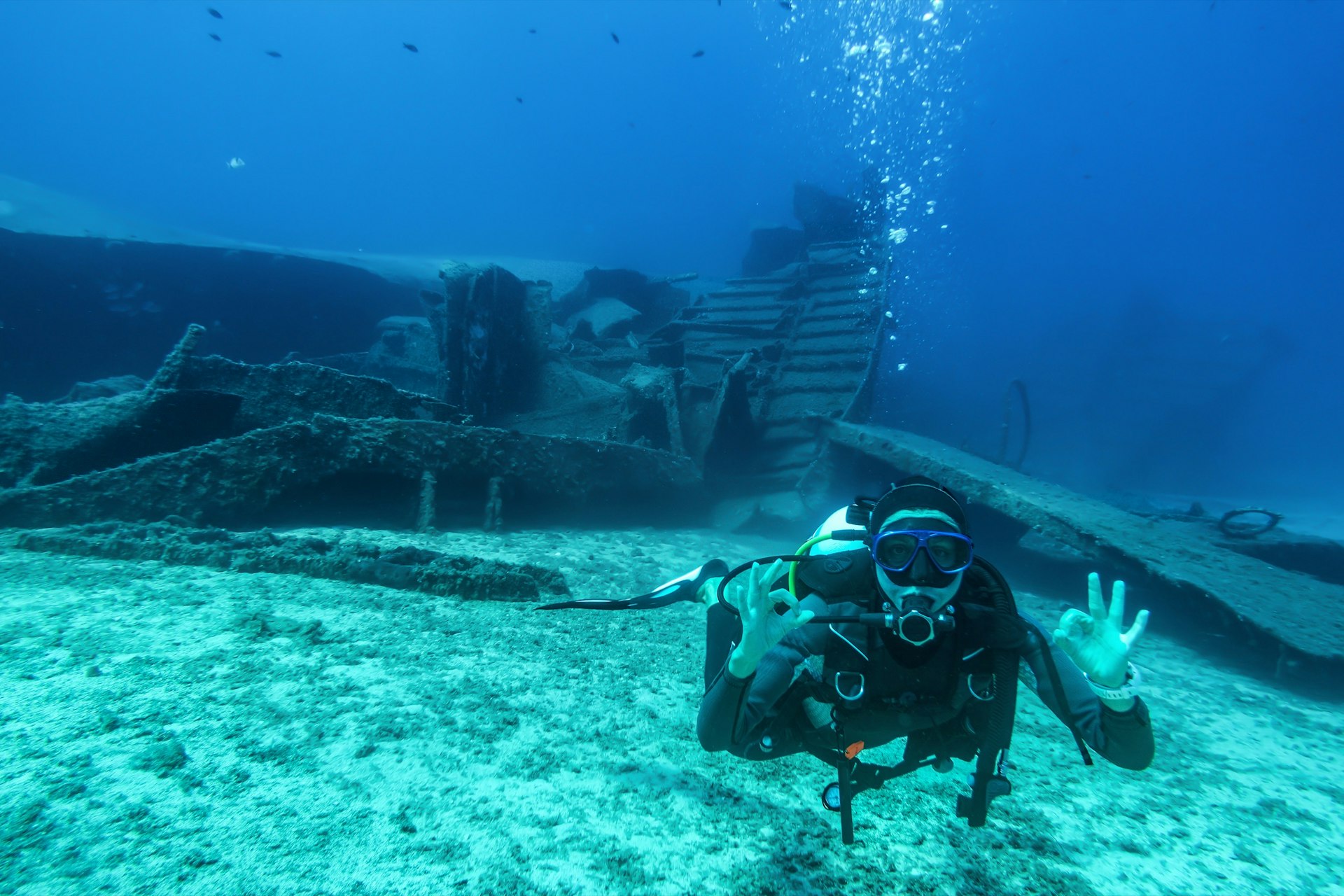
Underwater escapades
There are unlimited opportunities to responsibly explore the depths of the Aegean and the Ionian sea, as snorkeling and scuba diving lessons are offered everywhere. The emerald, azure, and cobalt blue waters of the Greek seas accommodate a wealth of marine life, a dramatic underwater landscape, and dozens of shipwrecks (and some aircraft) accessible by both experienced and novice divers.
Thus, the latest exciting additions to the country’s marine spectacle are the new underwater “museums.” Peristera near Alonissos, where visitors dive to admire an impressive ancient wreck, was the first of its kind when opened in 2020. Three more will be inaugurated in the summer of 2022.

Off-season is the new chic
With an average of more than 250 days of sunshine per year (up to 300 for some southern parts of the country), and exceptionally mild winters, there is no reason for an environmentally conscious traveler to visit Greece during peak season. Especially in August, most Greeks’ traditional holiday season, the country’s tourism infrastructure is under severe strain.
Traveling off-season , means smaller crowds, better services, and of course lower prices. And certainly Greece in April, October, or even during the winter months has an appeal, that more and more savvy and seasoned travelers find irresistible.
Sponsored by Greek National Tourism Organisation
As a travel entertainment and inspirational media outlet, we sometimes incorporate brand sponsors into our efforts. This activity is clearly labeled across our platforms.
This story was crafted collaboratively between Greek National Tourism Organisation and Lonely Planet. Both parties provided research and curated content to produce this story. We disclose when information isn’t ours.
With sponsored content, both Lonely Planet and our brand partners have specific responsibilities:
Brand partner
Determines the concept, provides briefing, research material, and may provide feedback.
Lonely Planet
We provide expertise, firsthand insights, and verify with third-party sources when needed.
Explore related stories
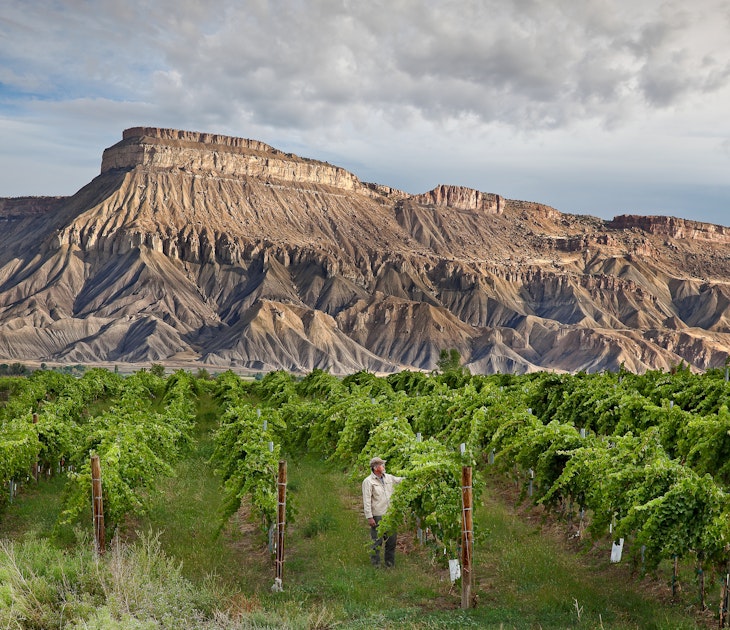
Wildlife & Nature
Mar 16, 2022 • 7 min read
From a vineyard in Chile to a farm in South Africa, here are the most incredible agritourism destinations in the world.

May 30, 2024 • 5 min read

May 30, 2024 • 12 min read

May 30, 2024 • 6 min read

May 30, 2024 • 10 min read

May 30, 2024 • 7 min read

May 30, 2024 • 3 min read

May 29, 2024 • 7 min read

May 29, 2024 • 5 min read
- ENVIRONMENT
- FOREIGN POLICY
- REAL ESTATE
- WHAT’S ON
- LATEST NEWS
- GREEK EDITION
Climate change will impact tourism
Climpact network studies how the industry will be affected by extreme weather phenomena while also seeking solutions.
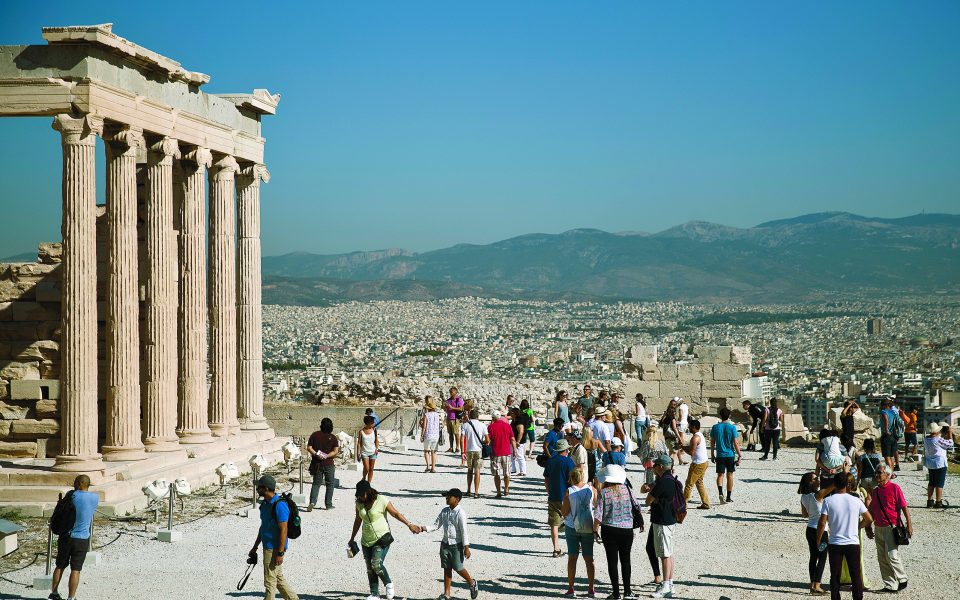
The evolving climate crisis will pose a serious threat to the tourism industry, greatly impacting Greece. How will tourists react if their blissful Mediterranean summers transform into hellish climate disasters, with unpredictable heatwaves and droughts, unreliable water resources, disappearing beaches and eroding coasts and monuments? On the other hand, how do we expect to accommodate mass tourism without the further depletion of our natural resources?
Maria Kanakidou, professor of environmental chemistry at the University of Crete, says: “In recent years, climate change has clearly manifested itself in extreme weather events – hurricanes, wildfires, floods, storms – which are impossible to overlook. It is about time we acknowledged the threat of irreversible climate change. At our current pace, the coldest day in 100 years’ time will be today’s hottest.” Kanakidou moderated the 2nd Forum on Climate Change and Tourism in June, organized on Crete by the national network on climate change CLIMPACT.
Kanakidou further elaborated: “The consequences of climate change have materialized in many ways which negatively affect tourism and therefore Greece’s GDP, and will continue to do so. High temperatures create unfavorable conditions for visitors, leading to discomfort, even at night. High heat also requires higher energy consumption for cooling and air conditioning, which contributes to increased costs and environmental pollution from energy production. Droughts lead to a drop in the water table, resulting in brackish water entering underground reservoirs. On Crete, the lower snow cover threatens the stability of water reserves and could trigger serious water supply issues. Coastal erosion is another major problem, as it’s simultaneously eliminating the coasts’ natural beauty and destabilizing infrastructure.”
The increasing frequency of intense or extreme weather events also negatively impacts tourism, “an industry which relies on a sense of security in order to grow. The more frequent fires, storms, floods and cyclones become, the more concern there will be. This concern will serve as a deterrent to further tourism, which is founded on the natural beauty of the sea, mountains, caves etc.”
The climate crisis will have severe consequences on all the aforementioned ecosystems. The climate has been damaged to a point where it can no longer regulate itself, and we are seeing that in forms such as falling crop yields and increases in the population of certain insects that can spread diseases previously rare in Greece that can harm trees and humans.
Despite the multitude of worrying trends, one positive aspect is the extension of the tourist season. Higher temperatures make it possible to stay in coastal areas deeper into autumn and earlier in spring. Still, this cannot be counted as an outright gain. Firstly, if part of the summer season becomes unbearably hot, those losses will need to be made up for. Also, as the forum was told, as northern countries’ climates become hotter, we could potentially see a migration of tourists away from the hotter Mediterranean.
Manolis Plionis, director and chairman of the board of directors at the National Observatory of Athens, and coordinator of CLIMPACT, told Kathimerini that “tourism is a sector that will be significantly affected by climate change. Countries like Greece, which rely heavily on this sector for a significant part of their GDP, thoroughly need to study the expected impacts in every region and develop policies to adapt the sector to the imminent changes. The Greek scientific community has contributed through the shared expertise of the CLIMPACT network.”
“Tourism is an activity with a large carbon footprint and wide environmental impacts. The overwhelming production of waste, high energy consumption – which contributes to climate change – and unsustainable water consumption, as well as other non-renewable resources, require rethinking,” Kanakidou said. As presented at the forum, numerous large tourist corporations are taking measures: managing food and wastewater, using renewable energy sources, and also trying to raise awareness among customers – for example avoiding changing towels too often.
“Tourism trends and tourist behaviors are changing. New, more environmentally friendly and nature-oriented forms of tourism are developing, such as ecotourism and agritourism. The percentage of visitors not staying in large hotel complexes is expanding – a trend which has been catalyzed by the pandemic, during which the number of Airbnb rentals on Crete doubled.”
The programs at the research station of the University of Crete in Finokalia and the research station of the Demokritos National Center of Scientific Research at the top of Mount Helmos contribute to educational and nature tourism. “These are beautiful places worth visiting. There, we offer information about the work carried out at the stations and climate change,” says the University of Crete professor.
Subscribe to our Newsletters
Enter your information below to receive our weekly newsletters with the latest insights, opinion pieces and current events straight to your inbox.

Wildfires released ‘extremely harmful’ particles
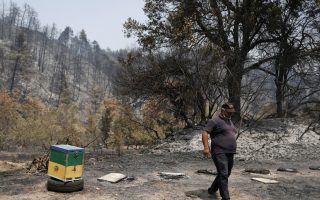
Pine honey threatened as wildfires destroy hives and forests
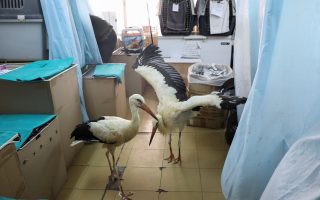
Disoriented by wildfires, migrating storks die crossing Greece
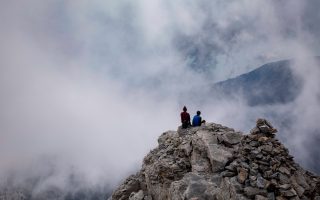
Plans to start charging admission to Olympus

A 2,421km run for the climate
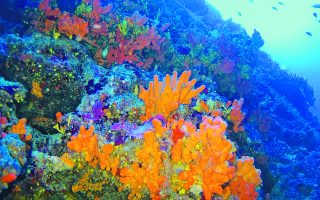
Mediterranean marine life under threat
UN Tourism | Bringing the world closer
Share this content.
- Share this article on facebook
- Share this article on twitter
- Share this article on linkedin
Greece Welcomes UNWTO Support for Sustainable Tourism Growth
- 18 Feb 2020
The Secretary-General of the World Tourism Organization (UNWTO) paid a high-level visit to Greece to meet with the Prime Minister and Minister of Tourism and offer the United Nations’ specialized agency’s support as the country works to grow and diversify its tourism sector.
Secretary-General Zurab Pololikashvili was in Athens for high-level talks with political leaders, as well as high-level representatives from across the private sector. The discussions focused on the key issues of harnessing tourism as a driver of education and opportunities for all, encouraging entrepreneurship and promoting tourism investment.
Working with UNWTO gives Greece the chance to learn from the lessons of other countries, share positive experiences and build useful partnerships in the areas of education, innovation and sustainable development
Mr Pololiksahvili said: “Greece is one of the world’s true tourism leaders. They also chair the UNWTO Regional Commission for Europe, highlighting the country’s commitment to international cooperation and to sustainable and responsible tourism ." Looking forward to returning to Greece in the very near future, he added: “I am delighted to be further strengthening our partnership and look forward to working more closely with Greece to make sure as many people as possible, including rural and coastal communities, are able to enjoy the many benefits tourism can bring.”
Greece Committed to Working with UNWTO
Prime Minister Kyriakos Mitsotakis welcomed UNWTO’s visit and support of the national tourism sector and showed a sincere interest for prospects of the cooperation with the Greek tourism sector . At the same time, Minister of Tourism for Greece Harry Theocharis expressed his thanks to the UNWTO for the official visit and welcomed its readiness to work alongside Greece in promoting year-round tourism and digital transformation.
He added: “Working with UNWTO gives Greece the chance to learn from the lessons of other countries, share positive experiences and build useful partnerships in the areas of education, innovation and sustainable development.”
European context
UNWTO welcomed Greece’s commitment to sustainable tourism development, making the case for tourism as pillar of stability in uncertain times.
The visit of UNWTO to Greece comes as UNWTO assumes leadership of the global tourism sector’s response to the climate challenge. Later this week, Secretary-General Pololikashvili will address the European Parliament's Committee on Transport and Tourism (TRAN). The intervention in Brussels will be made against the backdrop of the first meeting of the Tourism Task Force, with its Members to discuss the place of tourism in the European Green Deal , including both the opportunities and challenges.
Official visit to Greece
Related links.
- Download PDF
- European Green Deal
- Photo Gallery
Related Content
Un tourism joins launch of ireland’s first sustainable ..., un tourism and hotelschool the hague to drive innovatio..., european committee of the regions and un tourism break ..., un tourism and croatia to establish research centre for....
Greece’s tourism dilemma complicated by global warming
Greece letter: conflict exists between a national policy for sector and ‘foreign investment’.
Experts are aware of the consequences for tourism, especially mass tourism. But not, it seems, politicians and those deriving profits from the sector. Photograph: Bloomberg
For centuries Greek tenant farmers struggled to support families on infertile land which produced famine and provoked emigration, rather than sustenance.
As in Ireland, a series of land laws transferred ownership from landlord to tenant. Owning the land where you were previously a tenant changes one’s attitude, yet still the land yields little hope.
Then, from the 1950s onwards, northerners – predominantly from Britain, Scandinavia and Germany – discovered sun holidays and paid these landowners to allow them to lie on their beaches, turn red in the blistering sun, and risk skin cancer. Suddenly, a barren and inhospitable landscape became a picturesque profit centre.
No one could blame the lucky owners for profiteering: it would take an environmentalist with a heart of stone to condemn a modest xenodoxeio (hotel) with a taverna providing work for the family, investment in the locality and a sense of self-esteem.
Two Afghan journalists beaten after being detained by Taliban
:quality(70)/cloudfront-eu-central-1.images.arcpublishing.com/irishtimes/OPOL2OOXDORVWKRGZZNWI6SLQA.jpg)
First flight with passengers leaves Kabul since US withdrawal
:quality(70)/cloudfront-eu-central-1.images.arcpublishing.com/irishtimes/RGWWO2344RYSV6I7YDUFYDUYVU.jpg)

Mexico’s supreme court votes to decriminalise abortion
:quality(70)/cloudfront-eu-central-1.images.arcpublishing.com/irishtimes/P4WTTFC35PX6DTBJ6OM5IXCA6I.jpg)
The environmental impact of these resorts is disastrous in policy terms
Today, however, the vast majority of Greek tourism developments are owned by multinational consortiums – often Russian or US based – creating massive self-contained resorts whose visitors spend little or nothing in the locality and whose profits are exported.
The environmental impact of these resorts is disastrous in policy terms. Tourism is an industry with a large carbon footprint. Conversely, tourists require a sense of security which cannot be guaranteed in the face of the challenges posed by climate change, the Covid pandemic and the refugee crisis, which threaten the traditional structures of tourism.
There is a conflict between a national policy for tourism, which could confront these challenges, and the need for “foreign investment”, which has become government-speak for “progress”, a symbol of the country’s modernisation for which it has striven since independence.
Scientists, economists and environmentalists are aware of the consequences for tourism, especially mass tourism. But not, it seems, politicians and those deriving profits from tourism.
Greece, which is heavily dependent on tourism, has boasted for many years of its intention to develop niche markets since mass tourism is globally in decline. But it has done little to make it happen. Greece is famous for vines and olives – because, like the people themselves, they are resilient – but agritourism is neglected as a niche market, as are music, film, literature, hillwalking, archaeology, gastronomy and golf, for example.
Confusion about Covid-19 continues to make the tourism industry a minefield of speculation and uncertainty. These anxieties have been exacerbated not only by the usual massive influx of tourists but by young locals congregating in parks and narrow streets with little apparent awareness of, or concern about, the danger of infection. As with similar situations in Ireland, the police have little or no power to intervene.
Close the country, and whole areas of the economy will go to the wall
So extensive is the disregard for the danger of infection that in Mykonos, the holiday place for the super-rich, the "coronaparty" became the norm. On national television we were treated to footage of a villa party in Mykonos attended by 80 people dancing and hugging, when music in public bars is forbidden. Curfews were introduced in several holiday centres including Mykonos and Crete.
A government minister pointed out that not only are such people “playing with their lives” but that they are “playing with the lives of others”. His warning applies equally to any country where tourism, or any other type of socialisation (such as bars and restaurants) depends on the lifting of Covid restrictions.
It points to the fiscal imperatives of facilitating social contact. Close the country, and whole areas of the economy will go to the wall. Open the country to tourists and a number of people will die.
But the major impact on tourism is not at all uncertain – a forum on climate change and tourism held recently in Crete raised the questions: how can tourism respond to the discomfort of the increasing temperatures; the lack of adequate water; and the dangers of wildfires, which not only destroy thousands of acres of virgin forest but also cause deaths; and how can tourism expand without further depleting the natural resources which are its chief attraction?
Heat waves (which will become the norm) exert increased pressure on electricity supply, while rising temperatures bring greater danger of wildfires and drought. Increasing numbers of tourists, especially in large complexes, create unmanageable amounts of waste.
Politicians are cracking under the pressure of having to make unpopular decisions
The Crete forum was told that Greek gross domestic product (of which tourism accounts for more than 20 per cent) will suffer if policies are not developed to adapt to imminent change in climate, infrastructure, erosion of coastlines and monuments, and sea pollution.
But policy change will upset vested tourism interests. And, as Athens journalist Maria Katsounaki pointed out, "politicians are cracking under the pressure of having to make unpopular decisions – something the political system was not prepared for".
The urge to be “modern” like everyone else can mean abandoning who you are, and why you fought originally to control those ancestral acres of bleak and unremitting landscape.
America on the verge of isolationism? Expect another small war quite soon
France prepares to relive night of isis terror in ‘trial of the century’, taliban declare victory in panjshir, but opposition deny being defeated, member of islamic state ‘beatles’ cell pleads guilty in hostage cases, in the news: who are isis-k and what threat do they pose, murder hornets: nest of 1,500 destroyed in us, smoke detector activated on international space station amid reports of burning smell, in this section, slovak prime minister fico released from hospital after attempted assassination, pressure mounting on us to let ukraine strike military targets in russia, parliamentary footsie among european right begins ahead of election, volcano in iceland erupts for fifth time since december, ‘we hope the worst has passed’: ukraine’s farmers plough on through wartime dangers, donald trump found guilty on all counts in criminal hush money trial, surgeon warns about dangers of medical tourism at inquests into deaths of two co cork women after gastric procedures, the sad story of the actor with a drawer full of cheques he just can’t cash, ‘could have been a lot worse’: dublin council rubbish van stolen and crashed into rail barriers, trump verdict a stunning end to a quintessentially new york legal tale, latest stories, joe biden allows ukraine to use us weapons to conduct limited strikes inside russia.
:quality(70)/cloudfront-eu-central-1.images.arcpublishing.com/irishtimes/UDSU2YAEXG4BKFN7AH24B7MJNM.jpg)
Naas tech firm VEI Global to invest €2m in 20 new jobs
:quality(70)/cloudfront-eu-central-1.images.arcpublishing.com/irishtimes/UOPNWADB3ZECFKE32ODPBJKYA4.jpg)
Three people arrested in connection with fatal stabbing of Kevin Walsh
:quality(70)/cloudfront-eu-central-1.images.arcpublishing.com/irishtimes/7IXITLR5JJA25OBD36UMMDSPCY.jpg)
Timeline: Trump’s $130,000 hush money payment and the path to the guilty verdict
:quality(70):focal(3699x1154:3709x1164)/cloudfront-eu-central-1.images.arcpublishing.com/irishtimes/JPARNPIBXWSMAGOLNZ44IHAGIM.jpg)
Explainer: What charges did Trump face in New York’s hush money trial?
:quality(70)/cloudfront-eu-central-1.images.arcpublishing.com/irishtimes/73V3R5INNCTELPM5YKGZOFNUEE.jpg)
- Terms & Conditions
- Privacy Policy
- Cookie Information
- Cookie Settings
- Community Standards
'Not only islands': Greece asks tourists to explore beyond the islands to prevent overtourism
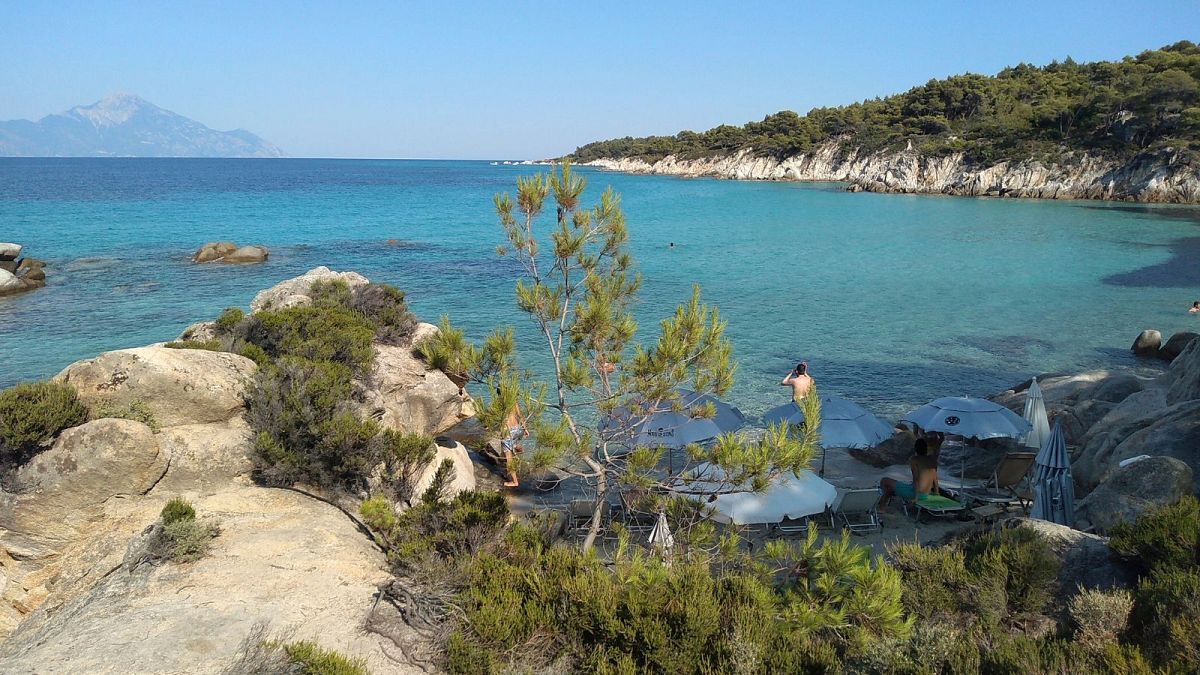
While most tourists choose Santorini or Mykonos, there's much more to Greece than its most popular islands.
Can you even claim you've been to Greece if you haven't posted a perfectly-posed snap of yourself in front of Santorini's white-and-blue homes and deep blue sea?
While in recent years the Greek island in the southern Aegean Sea has become a super-popular tourist destination and a must-see for influencers, the country's tourism officials say there's so much more to discover in Greece beyond Santorini - Plus, you'll be able to avoid the crowds while being a more sustainable tourist too.
Greece has long been committed to promoting sustainable tourism in its territory and tackling the environmental impact of contemporary travel. But for the country, sustainability means more than just preserving its world-famous landscapes.
"We are not only talking about preserving natural resources or protecting the environment. For us, sustainability is also something else," says Dimitris Fragakis, Secretary-General of the Greek National Tourism Organisation (GNTO).
"It's about how local communities get involved with tourism, because we want people to be close to tourism, not against tourism.
"There are some bad cases here in Europe of countries facing overtourism, where the locals are kicked out from their houses or their neighbourhoods. We don't want that."
Greece 's strategy to avoid overtourism is to expand the destinations people would want to visit across the country, and to encourage tourists to explore Greece not just in summer, but winter too.
"Greece is not just sun and beach, and it’s not only the islands. The beaches are also beautiful in northern Greece, and western Greece. Nobody knows these kinds of places. So we want to promote them. We want to show the people that you can go to a lot of places in order to have a quality vacation."
Where should I go?
There's plenty of beauty to be found in Greece, no matter where you are in the country.
The small village of Gialova, in the southwest of the Peloponnese peninsula, is a perfect spot to live the Greek dream of sun, beach, nature and gorgeous food while keeping away from the crowds. The village is a walking distance from the Gialova lagoon and nature reserve and it’s close to the ancient archaeological site of Pylos, a Mycenaean-era palace. Close by, there’s also the beach of Voïdokoilia, one of the most beautiful in the country.
View this post on Instagram A post shared by Eliseo Oberti (@eliseooberti)
You can get there from the city of Kalamata, an hour's drive away from the island and less than a three-hour drive from Athens.
While Santorini, Mykonos and Corfu are very much on the tourists' radar, there are also Greek islands which remain off the beaten track.
The tiny island of Ikaria, in the Aegean Sea, is widely overlooked by tourists, which means you'll only have to share its peaceful sandy beaches with the locals (and we’re talking about just 8,500 people, leading the traditional Greek way of life). You can get there by taking a ferry from the port of Piraeus, in Athens.
View this post on Instagram A post shared by Visit Ikaria (@visitikaria)
The Leros Islands in the Dodecanese in eastern Greece, are a paradise for those looking to chill by the beach or get sweaty climbing their rocky mountains. Each island is uniquely different from the other, from Leros' gentle green hills to Lakki's neoclassical houses, but they all boast beautiful, unspoiled beaches and mouth-watering seafood. You can get to Leros by ferry from Athens.
- Tired of the same old tours? Hyper-personalised travel is here to shake things up
- France, Greece, Spain? Nope, these stunning destinations are all in the UK
What's the most eco-friendly place to visit in Greece?
If you're worried about the environmental impact of your holiday, you should explore Chalki and Tilos, Greece ’s most eco-friendly islands.
The small island of Tilos, with its 500 inhabitants, became the first 100 per cent 'green island' of Greece and the entire Mediterranean in 2019, when the island, powered by renewable energy alone, declared itself completely self-sufficient.
Just a two-hour ferry ride from Rhodes , Tilos is all about slow tourism, sun, beach and sustainability.
Another sustainable choice is Halki. Inaugurated by Greece 's prime minister on 5 November, Halki is the first of several small islands in the Aegean Sea that the Greek government intends to make completely independent from the national grid and run entirely on renewable energy sources under the GR-eco national project.
View this post on Instagram A post shared by Adore Greece 🇬🇷 (@adoregreece)
The island has a power plant - which powers solar-powered phone chargers across the country - and all the vehicles on the island are electric.
A popular destination for a day trip from Rhodes, Chalki is well worth a longer stay to learn more about living more sustainably.
You might also like
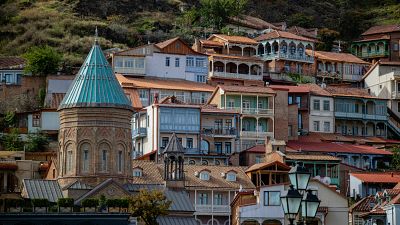
Why you should visit Georgia’s buzzy capital city for a budget break
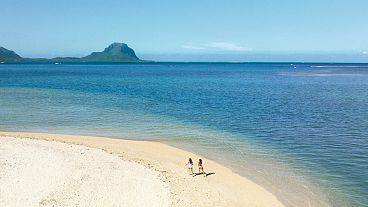
Mauritius, a paradise on earth
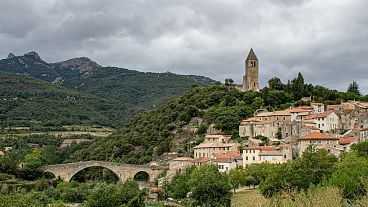
Get a taste of French wine and history with this €10 a day rail pass

- International Hellenic University Scholar Works
- Theses and dissertations

Files in this item
The impact of climate change on greek tourism industry-the growing demand of sustainability.

This item appears in the following Collection(s)
- 1748 Theses and dissertations
Related Items

All of IHU Repository

This Collection

- Hospitality
- Land Transportation
- Travel Operators
- Marketplace
- Top Archaeological Sites
- Tourism Education
- Niche Markets
- Trade Associations – Gov – Org
- Greek Hotels Reopening
- The Day After
- Local Actions
- Investment News
- Thought Leaders 2023
- Business Talk
- Recruitments
- 2024 – International Women’s Day
- 2021 – International Women’s Day
- 2018 – International Women’s Day
- Northern Greece
- Calendar of events
- Greek Hospitality Awards
- Tourism Awards 2019
- ITB Berlin 2024 Special
- ITB Berlin 2023 Special
- ITB Berlin 2019 Special
- ITB Berlin 2018 Special
- ITB Berlin 2017 Special
- 100% Hotel Show
- Philoxenia 2014 Special
- WTM London 2023 Special
- WTM London 2022 Special
- WTM London 2019 Special
- WTM London 2018 Special
- WTM London 2017 Special
- GTP Careers in Tourism
- GTP Ferry Connections
Greece: Overtourism or Poor Management? What is the Real Problem of Popular Destinations?
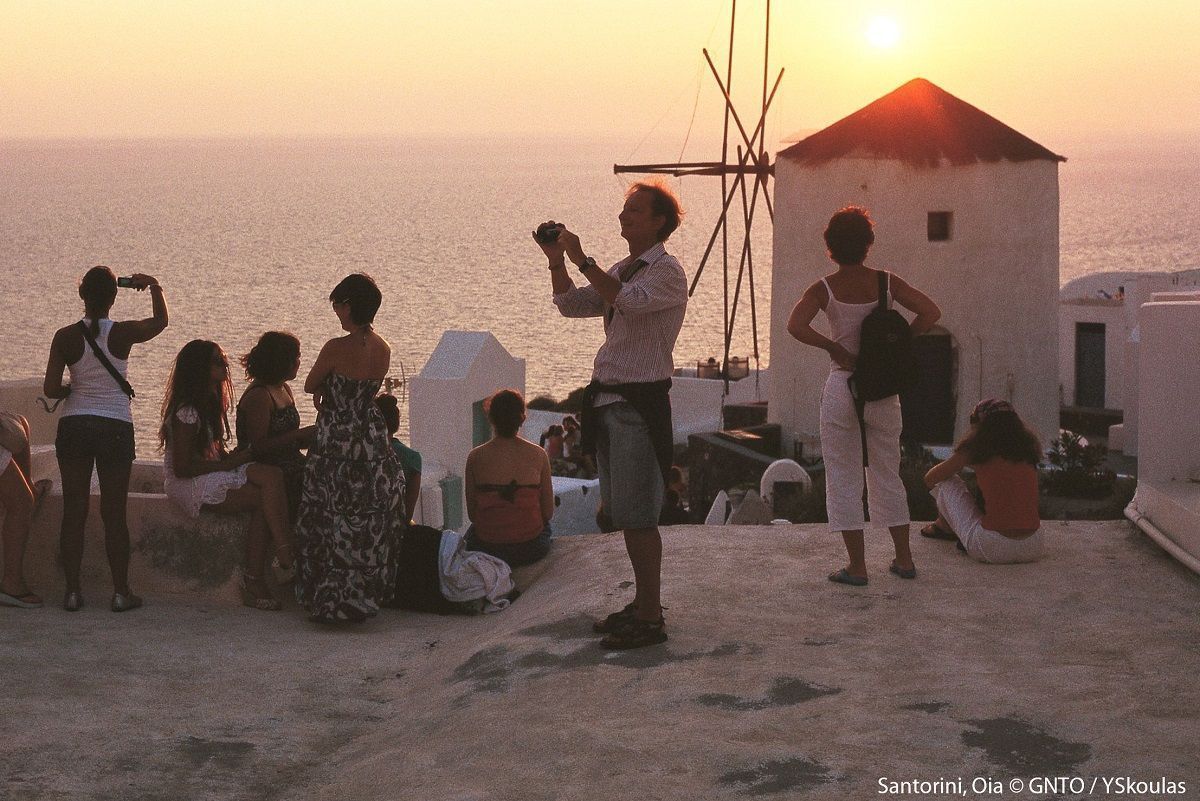
Santorini, Greece. Photo Source: Visit Greece / Y. Skoulas
Is overtourism one of Greece’s greatest challenges or is it poor management that creates endless overcrowding and congestion at highly visited Greek destinations?
After the halt of tourism operations in 2020 due to the outbreak of the coronavirus (Covid-19) pandemic , tourism traffic to Greece started picking up pace in the summer of 2021, increasing optimism among tourism professionals but also raising concerns about long-term issues including overtourism .
Tourism experts are now questioning previous practices and searching for new answers on how to address the phenomenon.
According to Dimitrios Buhalis , visiting professor at the Hong Kong Polytechnic University, tourism is a complicated sector that – depending on the circumstances – needs long-term strategies to be able to develop new experiences based on the diversity of the tourism product.
“This may sound easy but in fact, it is a very complicated process because tourism must be sustainable, profitable, support local communities and create experiences that visitors will convey to others,” he said, during a conference organized by job search engine Skywalker.gr on Thursday.

The event took place online with the participation of Greek tourism professionals Nikos Karaflos, CEO of Dexamenes Seaside Hotel; Anna Manias , co-owner of Greeking.me; Andreas Fatouros , CEO of Clio Muse Tours; Sustainable Tourism Expert Iyad Kayali ; and Michael Dritsas , chief of staff of Deputy Development Minister Christos Dimas.
Does overtourism exist?
While looking for answers, tourism experts set new a questions : Does overtourism even exist?
“We tend to simplify things. Overtourism does not exist. Greece’s problem is mostly caused by bad management policies ,” Professor Buhalis explained during the event.
He went on to add that decreasing tourism flows is not the answer.
“Most people discuss on ways to decrease the number of tourists. This is not going to happen. We expect tourism flows to increase further in the future,” he said, adding that as people improve the quality of their lives, travel is the next thing they will look for to create new experiences.
“So, the real issue is to manage tourism demand in a smart way and look for ways to evenly distribute tourism traffic to Greek destinations . We must promote different forms of tourism, experiences and other destinations to avoid overcrowding,” Buhalis added.
New gov’t approach
Meanwhile, new key strategies announced by the Tourism Ministry are in line with Buhalis’ suggestions, and focus on introducing other destinations and redirecting travelers to new locations.

Greek Tourism Minister Vassilis Kikilias
In a recent interview to Greek newspaper Kathimerini , Greek Tourism Minister Vassilis Kikilias said that efforts were being made to introduce lesser-known destinations to travelers through a unified information network.
Kikilias informed that a large part of the ministry’s actions is focused on the mainland and lesser on the popular islands, aiming to maintain authenticity and diversify tourism offerings.
The minister added that environmental policies are key to developing a sustainable tourism model that will create added value and distribute travelers evenly across the country’s destinations.
- Join the 15,000+ travel executives who read our newsletter
About the Author
Gnto looking into ‘creative tourism’ potential of greece, south aegean islands beat october 2019 tourist traffic levels, add your comment cancel reply.
Save my name, email, and website in this browser for the next time I comment.

Join our Newsletter
Join our GTP Headlines free daily newsletter

Signup to receive our daily travel-tourism industry newsletter.
SUBSCRIBE TO RSS
Copyright notice.
The team | About GTP Headlines
Greek Travel Pages, 6, Psylla str. Athens GR 10557 Call center: +30 210 324 7511
Contact Details
Guest posts are welcome. Read the editorial guidelines here.

- Jul 27, 2023
Negative Environmental Impacts of Tourism in Greece
Updated: May 20
Greece, known for its rich history, stunning landscapes, and welcoming culture, has long been a popular destination for tourists worldwide. However, the rapid growth of the tourism industry has led to the phenomenon of overtourism, resulting in severe negative impacts on the country's environment. We will explore the challenges Greece faces due to overtourism and its impact on the environment, focusing on its pristine beaches and other regions globally experiencing similar issues.

Overtourism in Greece
Tourism plays a crucial role in Greece's economy , contributing significantly to its foreign currency earnings. However, the over-reliance on tourism has caused overcrowding during peak seasons, leading to numerous challenges for both locals and tourists alike. Overtourism puts immense pressure on the country's natural resources and ecosystems, leading to adverse consequences for the environment.
Overtourism is a global phenomenon characterized by an overwhelming influx of tourists to a specific destination, often concentrated during peak seasons. In Greece, this has led to overcrowding in popular tourist spots, straining local infrastructure and services. The consequences of over tourism extend beyond the social realm, as the environment faces severe challenges due to the increased demand for resources.

Environment Impacts of Overtourism
The tourism industry heavily relies on both renewable and non-renewable resources available at any given location. This includes minerals, metals, and biomass resources that are crucial for maintaining the natural balance. Unfortunately, the unchecked growth of tourism in Greece has resulted in environmental degradation, including:
Habitat Destruction: Overdevelopment of tourist infrastructure can lead to the destruction of sensitive ecosystems, endangering local flora and fauna.
Pollution: Increased tourist activities often contribute to higher levels of pollution, including plastic waste, water pollution, and air pollution.
Strain on Water Resources: Overtourism strains local water supplies, affecting both residents and the environment.
Climate Impact: Carbon emissions from transportation and energy consumption by tourists contribute to climate change, affecting Greece's delicate ecosystems.
Challenges Faced by Locals and Tourists:
The negative consequences of over tourism are felt by both local communities and visitors. For locals, the influx of tourists can result in increased living costs, strained public services, and loss of cultural authenticity. At the same time, tourists may experience longer wait times, reduced access to attractions, and a less fulfilling travel experience due to overcrowding.
Emphasizing Sustainable Tourism:
To combat the adverse effects of overtourism, Greece must shift its focus towards sustainable tourism practices. This involves striking a balance between economic growth and environmental protection.

Tourism & Environmental Impact on Greek Beaches
As tourism booms in Greece, many once-secluded beaches are now witnessing an influx of visitors, leading to overcrowding complaints from both tourists and locals. The surge in negative reviews on platforms like TripAdvisor indicates the growing concern over this issue. Overcrowding not only hampers the tranquility and appeal of these beaches but also poses practical problems in managing the influx of people, putting additional pressure on local infrastructure and services.
Pollution's Toll on Marine Life:
The environmental impact of tourism on Greek beaches goes beyond overcrowding. Pollution from sunscreen and plastic litter has wreaked havoc on the country's marine life and delicate ecosystems . Pictures of once-pristine beaches like Navagio marred by piles of waste have gone viral, bringing to light the dire consequences of irresponsible tourism. When such garbage finds its way into the sea, marine life suffers, and entire ecosystems are threatened.
Strain on Natural Resources:
Tourism's insatiable appetite for resources can be especially taxing in regions where resources are already scarce. The increased demand for water, energy, and land use puts enormous stress on local ecosystems. Soil erosion, pollution, habitat loss, and pressure on endangered species are some of the adverse effects of this strain. Greek beaches, known for their natural beauty, are particularly vulnerable to these impacts.
Over Tourism's Global Impact:
The issues faced by Greek beaches are not isolated incidents but part of a larger global concern known as overtourism. Many other renowned tourist destinations around the world are grappling with similar challenges:
Mallorca: This Spanish island in the Mediterranean is struggling with environmental degradation due to excessive tourism, including overcrowded beaches and water overuse.
The Galápagos: The unique biodiversity of the Galápagos Islands faces threats from overtourism, putting stress on the natural habitats and endangering native species.
Bali: Overcrowding and mismanagement of waste are jeopardizing Bali's pristine beaches and cultural heritage.
Barcelona: This vibrant city in Spain is grappling with the impacts of overtourism, affecting its historic sites and local communities.
Thai Islands: Thailand's picturesque islands face pollution and environmental degradation due to tourism-related activities.
Venice: This iconic Italian city is grappling with over tourism's adverse effects, including damage to historical landmarks and water pollution.
A Move Toward Sustainable Tourism:
While the challenges posed by tourism are significant, there is hope in promoting sustainable tourism practices :
Educating Tourists: Raising awareness among tourists about responsible travel, waste reduction, and environmental conservation can make a positive impact.
Local Community Involvement: Engaging local communities in tourism planning and decision-making processes can ensure the equitable distribution of benefits.
Managing Visitor Numbers: Implementing visitor quotas for delicate beach areas can help preserve their natural beauty and protect marine life.
Waste Management: Encouraging proper waste disposal and recycling initiatives can significantly reduce the impact of litter on beaches and marine ecosystems.

Join a Cause
Discover the House of Beautiful Impact in Mykonos, an incredible event happening from July 25th to August 30th. Join us as we bring together famous innovators and thought leaders to address the global challenge of mass migration.
Beyond the typical party scene, create meaningful connections and enjoy beachfront yacht escapades with newfound friends. Engage in community cooking, kitesurfing, windsurfing, singing, and dance lessons to enrich your journey. Our Mykonos community radiates warmth, fostering a spirit of togetherness, laughter, and unforgettable shared moments. Whether you're a solo adventurer or a group seeking camaraderie, our inclusive haven welcomes all. Passionate about sustainability, we actively combat overtourism and pollution through eco-friendly pursuits, preserving the pristine charm of Mykonos.
Join us and reach out to Paula Schwarz at: [email protected] to reserve your spot and embark on an unforgettable journey!
Recent Posts
How Cosmopolis Can Help Your Organization
Empowering Women: Celebrating Women's History Month with Startup Boat
Addressing the NYC Migrant Crisis through Cosmopolis App and RefugAI

IMAGES
COMMENTS
The EU's emergency support package, with its emphasis on Green growth, provides an opportunity to guide the development of tourism in the required direction. Despite its importance for the economy and the environment, Greece lacks a coherent tourism strategy, whether short, medium or long term.
Here are some of the economic impacts of tourism in Greece: 1. GDP Contribution: Tourism in Greece is a major contributor to the country's gross domestic product (GDP). It accounts for a significant portion of the country's overall economic output. In recent years, tourism has contributed around 20% to Greece's GDP.
Even though Greece's tourism has made some progress so far, there is still much to consider in terms of awareness and action. ... The climate impact of global tourism and the urge to redefine tourism development in the 21st century The negative environmental impacts of tourism are important, and they include the depletion of local natural ...
In recent years, while coronavirus has been catastrophic for tourism in Greece, ... Sustainable tourism seeks to prevent overcrowding in popular destinations to reduce the negative environmental impacts of tourism and increase knowledge of a country's culture and history. It is often touted as an alternative to current trends in tourism.
INSETE, the Greek Tourism Confederation's (SETE) research body, on Monday released its latest report which includes guidelines for promoting sustainable practices in Greece's tourism industry.. The research body aims for the "EXPERT REPORT: Sustainable Tourism in Greece", carried out by Considerate Group, to create a path forward towards the planning of future actions and initiatives.
Greece's First Smart City. Trikala, 'Greece's first smart city', is set in the countryside north-west of Thessaly. It has around 70,000 residents, with many more people commuting in from rural areas in the municipality. To reduce traffic, pollution and CO2 emissions, the city has introduced several measures.
By Phil Butler. Early in 2019, the European Parliament's Transport Committee blasted Greek authorities for allowing tourism on Santorini to reach a point of complete saturation. The island, undeniably one of the world's most iconic destinations, has still not addressed these issues and now appears to be undergoing a kind of character suicide.
Greece has always been one of the world's most popular destinations, and the gradual growth of tourism over the decades have made both the state and the industry conscious of its environmental impact. Now the country is at the forefront of the effort to tackle the environmental challenges of contemporary travel.
Greece needs a 30-year adjustment plan to address climate change before it negatively impacts tourism and agriculture, said Athens University Professor Konstantinos Kartalis during the 1 st Kathimerini Summit - ESG held in Athens this week. "We need an adaptation plan for each region over a 30-year period. To create infrastructure that will keep water on the surface, enrich water levels ...
Tourism is one of the most important sectors of the Greek economy in terms of both GDP and employment, and receipts from tourism offset part of the country's trade deficit. This, among other things, was shown by the 2011 CCISC Report "The Environmental, Economic and Social Impacts of Climate Change in Greece", an
Greece has a rich environmental reserve. Its natural environment if distinguished for its high biodiversity in combination with a wide variety of biotopes, the quality of the bathing water and ... There are many other countries that face the problem of environmental impacts on tourism sector. We can compare these cases with ours and find some ...
Kanakidou further elaborated: "The consequences of climate change have materialized in many ways which negatively affect tourism and therefore Greece's GDP, and will continue to do so. High temperatures create unfavorable conditions for visitors, leading to discomfort, even at night. High heat also requires higher energy consumption for ...
UNWTO welcomed Greece's commitment to sustainable tourism development, making the case for tourism as pillar of stability in uncertain times. The visit of UNWTO to Greece comes as UNWTO assumes leadership of the global tourism sector's response to the climate challenge. Later this week, Secretary-General Pololikashvili will address the ...
The environmental impact of these resorts is disastrous in policy terms. Today, however, the vast majority of Greek tourism developments are owned by multinational consortiums - often Russian or ...
Greece has long been committed to promoting sustainable tourism in its territory and tackling the environmental impact of contemporary travel. But for the country, sustainability means more than ...
ENVS 220, Spring 2021. Consequences of Coastal Tourism in Greece
Re-visiting Greece in the World of Covid-19: Some thoughts on how museums and sites have used the current circumstances as an opportunity to begin making meaningful & sustainable improvements for ...
Author. Climate change is gradually shaping a new environment for Greek tourism. Its physical impact is expected to significantly affect the tourism industry in the medium and long term, aggravating some of its chronic weaknesses, while also highlighting new growth possibilities. Against this background, climate change considerations emerge as ...
After the halt of tourism operations in 2020 due to the outbreak of the coronavirus (Covid-19) pandemic, tourism traffic to Greece started picking up pace in the summer of 2021, increasing optimism among tourism professionals but also raising concerns about long-term issues including overtourism.
October 30, 2022. Greece has ample space for more hotels but needs to revamp the hospitality sector. Credit: Greek Reporter. By Phil Butler. So-called "overtourism" in Greece and Cyprus has less to do with the destination's desirability than with infrastructure and accessibility. It is a symptom of a broader problem.
This paper focuses on the dynamic of the recent upheaval in the tourism and hospitality sector due to the COVID-19 epidemic in Greece and Santorini island. It uses the case study of a country one-fourth of whose GDP consists of tourism. We compare the available statistical data showing the change in variables in the previous years with 2020 and look into the new challenges and opportunities ...
Destinations on Santorini. There are several important natural and tourist locations on the 76.19km² island of Santorini. The island was created by a volcanic eruption in 1600 BC. The physical geography of the island, settlement history, Greek architecture, tourism trends, and the sunny tropical weather, create many unique locations on the island.
The environmental impact of tourism on Greek beaches goes beyond overcrowding. Pollution from sunscreen and plastic litter has wreaked havoc on the country's marine life and delicate ecosystems. Pictures of once-pristine beaches like Navagio marred by piles of waste have gone viral, bringing to light the dire consequences of irresponsible tourism.
In this latest index, the US has the highest overall score of 5.24. With an overall score of 4.52, Greece has seen a significant improvement on its 2019 ranking. The country received a high score for health and hygiene at 6.34, a decent score of 5.95 for tourist services and infrastructure, 5.85 for ICT readiness, and 5.52 for air transport ...